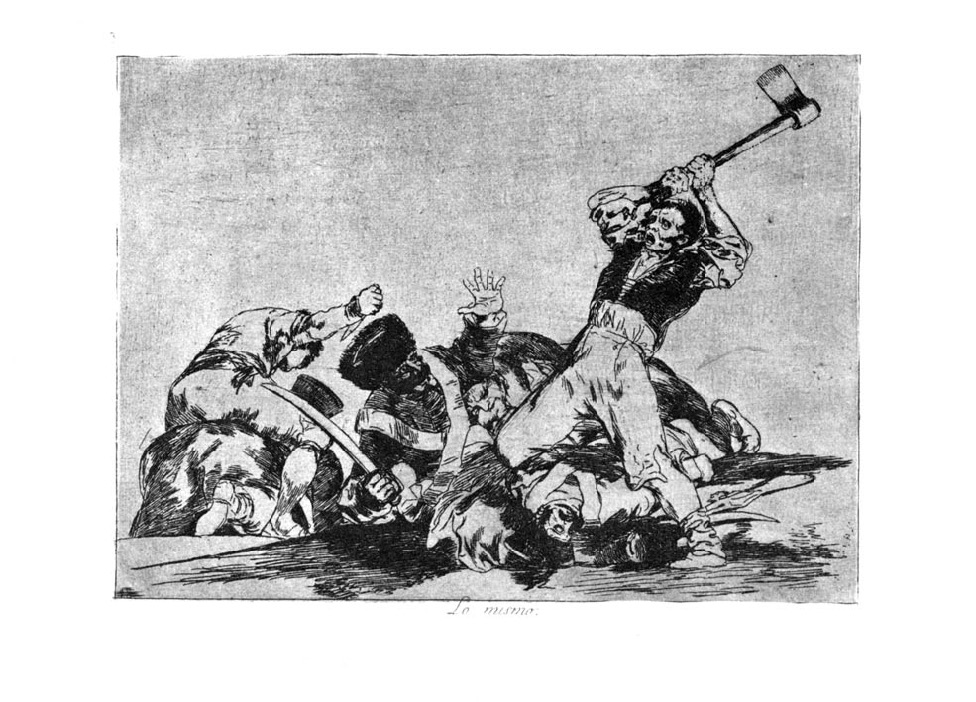|
That's why I make sure to always send mine in Sanskrit, using a simple substitution cypher. I don't want to make stuff difficult for them, after all.
|
| # ? Dec 3, 2012 12:10 |
|
I am both Gallant and Goofus in equal measure. 
|
| # ? Dec 3, 2012 12:32 |
|
No one is immune from this and CVortex didn't point to anyone's reports to me as being complex, he just said that many were very difficult to process and took him a long time. Hope you all know no one was being singled out! Just wanted to mention from my own experience which turns were easy for me to process and which weren't. I can even show some from the past Israelsim... These were good turn orders, easy to process and easy to understand... they go from essentially no flavor to a lot of flavor while still being easy to understand. quote:1. Speak in Czechoslovakia and Hungary to encourage aliyah and raise money. quote:1. Continue training Haganah militias, using the newly formed Yafa Palmach cadre as a team of roving instructors. Have technically-skilled militiamen employed in the community workshop armories begin producing automatic weapons, up-armored civilian vehicles and command-detonated explosives. quote:1) The primary event my tribe is focused on is the march for justice. Here's a turn order that gave me brain damage reading it... quote:Firstly, the push for Jewish immigration will continue, as well as requests for economic agents to make trade deals with Arabs and Jews in the region, especially with the PCA, which has been very cooperative in hearing out proposals for concessions in America's favor. They have many connections in the region that could prove very useful, including Arabic newspapers. Anything to promote a long term relationship with the organization is likely to prove useful to the United State in both the short and long term. The PCA requires tools to irrigate the region and to build hydroelectric dams and advisers to help coordinate their projects; these should be provided. Here's another order that was simply way, way too much... quote:1) We have brought all three tribes of Bedouin Arabs to the table due to
|
| # ? Dec 3, 2012 12:34 |
|
Hey, I'd like to sign up as a radical Jacobian.... Email is marcuswire@yahoo.com
|
| # ? Dec 3, 2012 16:22 |
|
You still need to pick out a specific historical figure. Have you used IRC before? Try joining #bop on synirc.net - the GMs and many of the players usually are on there, and can offer advice.
|
| # ? Dec 3, 2012 17:24 |
|
If Danton is still inactive, you should take over as him, or another member of the Cordeliers.
|
| # ? Dec 3, 2012 20:41 |
|
"...Realpolitik is the art of doing what is necessary and what is possible in the interests of your Kingdom. It is often perceived by those with smaller minds as unethical, or even traitorous..." Collected works of the Teacher, volume I: Purgation
|
| # ? Dec 4, 2012 01:39 |
|
LEGISLATIVE NEWS: - The Rights of the Minorities of France Act barely passes through some legislative manipulation by the Triumvirate. Minorities are guaranteed protection of language, culture and religion. This forces some Occitanian thinkers to rethink their position but angers more radical French revolutionaries who see the French nation as inviolable. It is a tribute gesture more than anything, but still attracts controversy. - This is highlighted by the Religious Liberty Act which by and large contradicts large parts of the previous act. French lawyers tear out their hair, arguing the government has just undermined their own legitimacy and thrown the French legal system into turmoil. Religious rights are protected, except when they are not! Popular support for the government dimishes slightly and relations sour with the Papal States. - The Treason Act, The Emancipation Act and Prices Act all pass in the Legislative Assembly thanks to the Jacobin majority. The penalties for supposed ‘traitorous’ activities has been increased substantially, making what few moderates remain in France nervous. Government popularity declines somewhat but people are not willing to oppose the government yet. Traders violently protest the Emancipation Act and vow to defect if slavery is ended. - The Amnesty Act passed a few days later, though, gives enemies of the state an opportunity to avoid penalties. With confidence in the government increasing, many do just this. STRATEGIC COMMAND: - The mobilization centers send 80,000 untrained and freshly recruited troops into the field - with 30,000 heading to the Breton border from Tours, another 20,000 each from Paris to reinforce the armies of the Rhine and the North, and 10,000 to the Army of the Alps from Marseilles. The loyalties of these men - and likely those of future mobilizations - are openly with the radical Jacobins and the Republic. - Large portions of the regular arms shipments to the military suddenly disappear, leaving many of the new recruits without weapons. Italian Campaign - Commander: Michel Ney 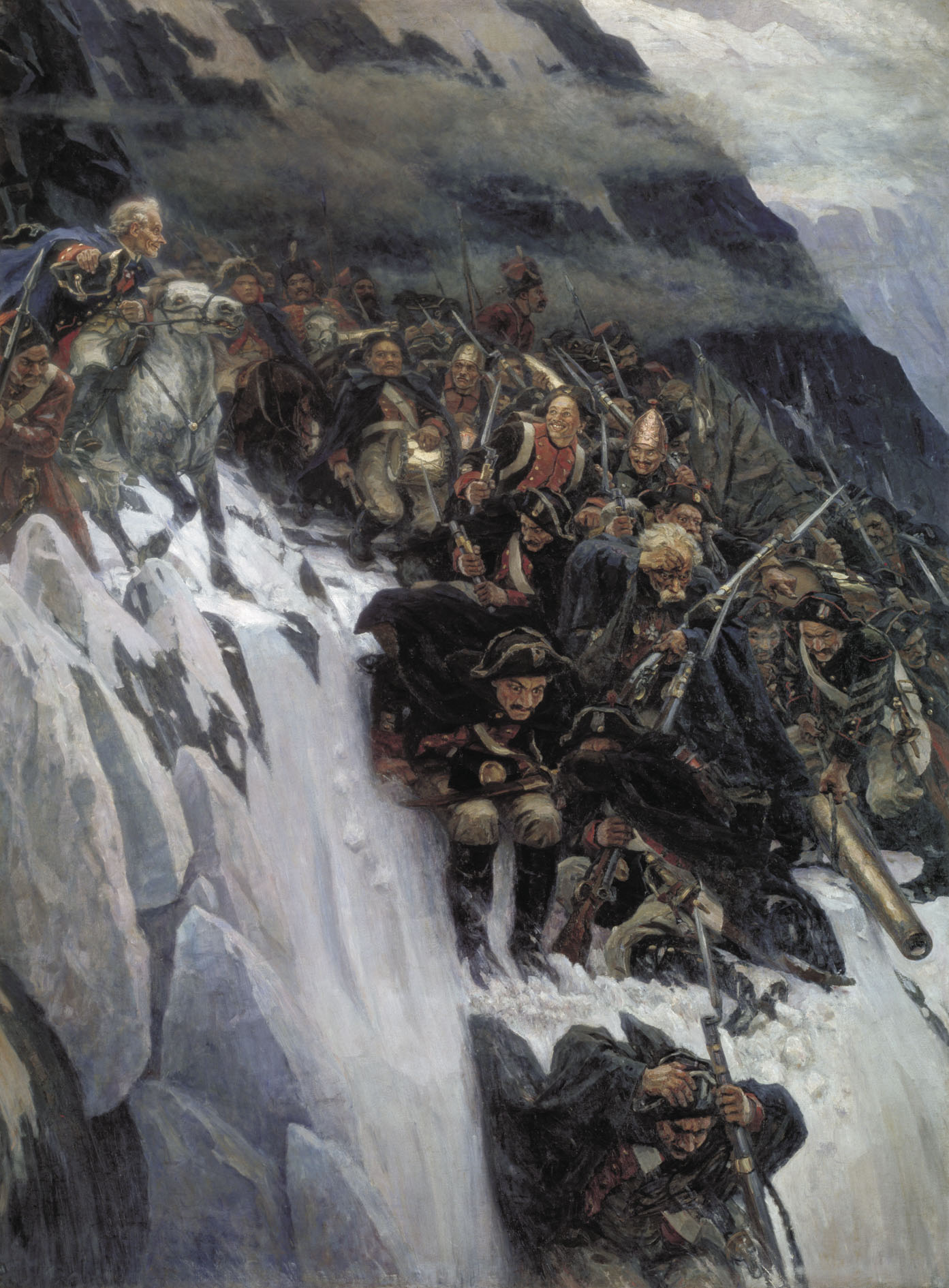 - A surprise offensive is launched against the Kingdom of Sardinia-Piedmont, whose territories on the French side of the Alps are tantalizingly vulnerable. The invasion has two components: one force, composed of 15,000 men, advances towards Nice and captures the city after a month-long siege. His forces secure some of the possessions (3 credits) of the landed nobility in the region. - Another, smaller force of 5,000 men marches into the ancestral homeland of the House of Savoy, where they are able to capture large swaths of territory unopposed thanks to Savoyard difficulties getting their forces across the Alps to meet the invaders. The French meet no resistance from the civilian populace, and in fact are welcomed as liberators... for the time being. - As Sardinia-Piedmont diverts its forces to meet the smaller of the two armies, 30,000 men push from Grenoble to reinforce them. Ney’s attempt to push to Turin is countered in the narrow Alpine passes, where the Savoyard armies hold the advantage despite their inferior numbers. They manage to repel the Republican invaders, though this situation cannot last forever. They are counting on aid from the Emperor. - By the end of the Spring, 47512 French soldiers remain in the Armée des Alpes, with the Alps themselves forming the new border between the French conquests and “free” Sardinia-Piedmont. It is up to the French government to decide what to do with this occupied, and largely friendly, territory. Flanders Campaign - Commander: Andre Massena  - Austrian forces have yet to arrive to reinforce the beleaguered Brussels garrison, and so with the death of the Prince and the arrival of Massena’s recuperated forces the city surrenders without a fight. The rest of the Austrian Netherlands offers little resistance with the collapse of Imperial power in the region, and by the end of May most of it is de facto under the control of France. Reminded of the earlier revolution of 1790 by Massena himself, many in the region clamor for independence - but most in Paris and France itself feel that “Austrian” Wallonia and Flanders are French and should be annexed. The decision ultimately lies with the government. - The French seize vast amounts of wealth from the erstwhile capital of the Austrian Netherlands (5 credits), all of it now resting comfortably in Massena’s new command center. Massena is expected to send these spoils to the government in Paris.  Defense of Alsace and Lorraine - Commander: Alexis de Tillières - Efforts are undertaken by the Armée du Rhin to secure the Rhine against outside attack - namely by the Prussian forces beneath the Duke of Brunswick. Attempts are made to set fire to or otherwise destroy the bridges in the region, though the Prussians manage to cross before the bridges in the north can be destroyed. They secure them and leave behind a small force to ensure a route of retreat. - In late March, the Prussians circle hard around the French forces and bypass the bulk of the army in Alsace entirely, instead punching from the north into French territory and arriving at Metz. Guerilla warfare, openly encouraged by de Tillières, is mostly ineffective despite the advantage of terrain, with the Prussian lines massacring the sporadic skirmishers sent their way. These Prussian strategic gains grant them clear passage to Paris, inciting mass panic among Republicans in Paris... panic that would later be seized upon. - Meanwhile, the Austrian Armee von Prag - in coordination with the Prussians - reaches the southern river Rhine but is prevented from advancing into Alsace because of the lack of a bridge. They are forced to wait while their engineering corps constructs a crossing, something that takes at least a week. This prevents what would otherwise have been a surprise attack on the Army of the Rhine, and later military historians believe that this ultimately saves de Tillières from encirclement and a mass surrender. - The Prussians settle in for a siege of Metz when, in late May, de Tillières finally decides to commit his forces to the field. Despite earlier losses in the guerilla campaign, the French manage an overwhelming victory against the demoralized and - with the seizure of the Austrian Netherlands - poorly supplied Prussian invaders at Metz. With the French army hot on their tails, they are forced to cut a hard retreat back across the Rhine, making this a decisive French victory and opening the way for a French advance across the river. The French people are elated by the news. - The French have 44758 soldiers, 3612 cavalry, and 50 cannons remaining. Prussian numbers are unknown, but believed to be similar or smaller. The Prussians are retreating far further than just the river, and with the Russian annexation of Poland, fear of an eastern attack seems to be forcing a relocation closer to Brandenburg. Breton Campaign - Commander: The Marquis de Lafayette 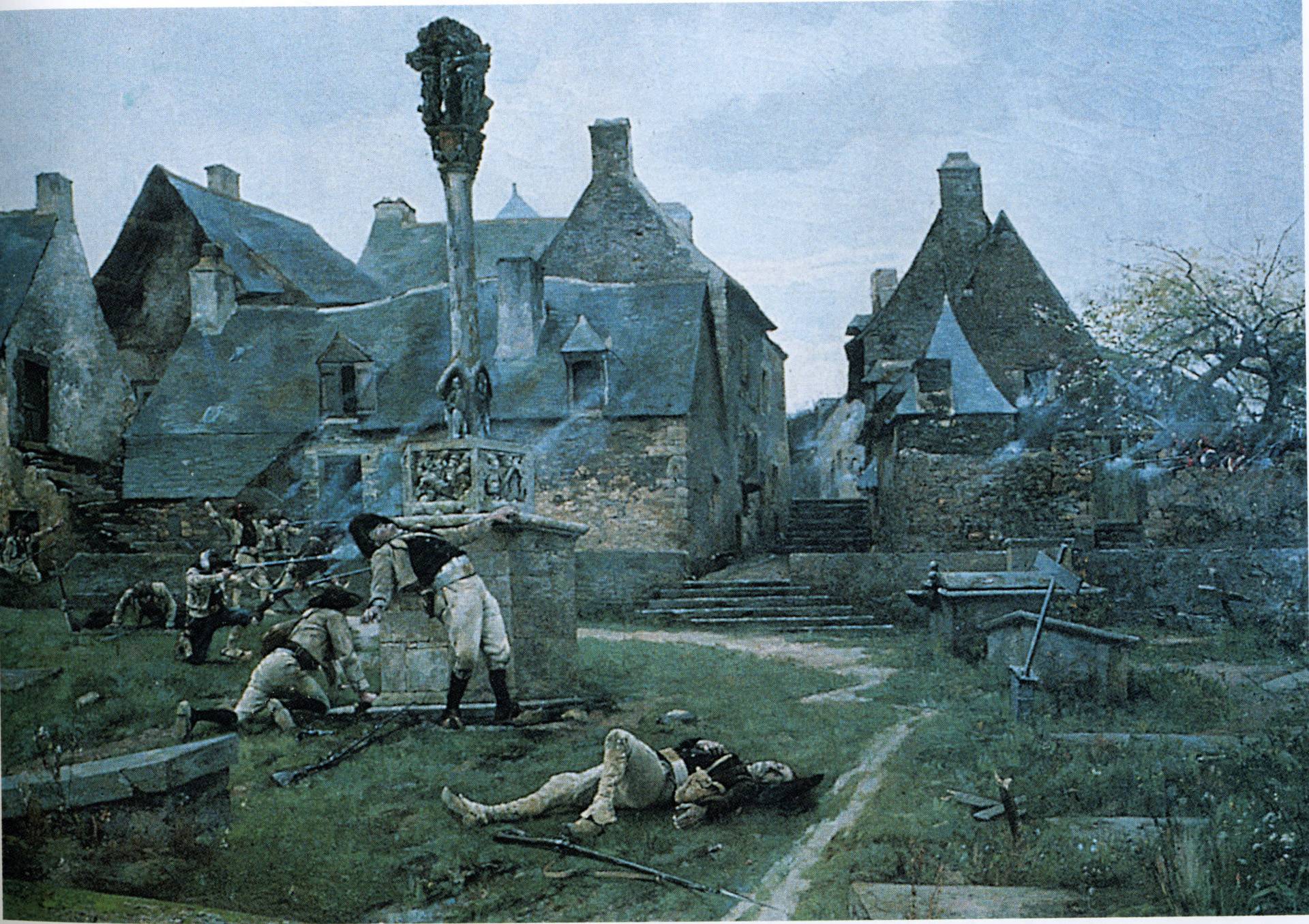 - An outbreak of dysentery strikes at Lafayette’s already ailing troops, and supply seems to be nowhere in sight after heavy raids on shipments across the border. Dozens fall dead. Lafayette makes the decision to pull back to the border, where - if he can reach it - he will be met by a host of reinforcements... and then together they will push on Brittany. These new men will not be trained, but they do not have to be. They will only have to live long enough to die. - Breton guerilla raids continue on Lafayette’s wearied army as it begins a march out of Brittany and to the border, with hundreds dying - though the soldiers actually do a better job fighting them off than in the winter, many now desperate for their own survival. Lafayette manages to cross the border and reenter supply, with the Coalition armies nowhere to be seen beyond light Breton border patrols - though at great cost. He has lost another 4,215 men to raids, disease, and desertion. - His troops rest for a few weeks as the new recruits are integrated into the Army of the Center. This is done fairly poorly, as the troops have almost no training and are being sent into foreign territory immediately as Lafayette relentlessly orders another march into Brittany - they will follow the Loire and forcibly demand passage from villages along it before reaching Nantes. Many of his officer corps are skeptical of the merits of the plan, but should the city fall the Breton cause will suffer a tremendous (and some say fatal) blow. They agree to back him, and the army marches. - A coherent supply system, guarded by ten thousand men specifically assigned to its maintenance, manage to ensure that the wagons from Tours reach the military. Breton raids are repelled for the most part, though they continue to hassle the French army. - At that point, Lafayette sends riders ahead of the army to the nearest Breton village, demanding passage rights for his troops and promising they will not be harmed. The Bretons respond by angrily hoisting the black cross on white above their huts, several taking shots at Lafayette’s troops. He orders his troops in and they burn the village to the ground, slaughtering the inhabitants - men, women, children. He fails to restrain his new recruits, and though it was he who gave the order for the slaughter, his men come up with some other unpleasant things to do with the Bretons. - His men salt the earth after stealing grain from the stores Tuffin had the villagers set up. Many more villages follow, so that swaths of devastation are left in the Republican’s wake. Mass graves are set up along the banks of the Loire in what will become a symbol of the Breton resistance. - Attempts by the French government to win over the Bretons with their new “equality” legislation are completely undermined by Lafayette’s blatant genocide. He is openly branded the Butcher of Brittany in articles published from London, though several villages closer to Nantes seem to finally get the message, waving the tricolor from their homes nervously and smiling broadly as Lafayette’s men pass through. Some are killed anyway, his troops having caught the taste of Breton blood. - The Bretons finish a mobilization of their own, with 12,000 fresh and completely untrained troops flooding their ranks in the wake of the massacres. This puts some strains on the Breton economy as the vast majority were farmers. A British expeditionary force likewise arrives, of about 8,000 men. Both forces are deployed somewhere to the north, relying on intelligence reports... even though the French army is now to the south. - Just outside of Nantes, Lafayette takes one hundred of his finest cavalry north with him and leaves his men behind to maintain the siege. They wonder where he’s going. - In a shallow cove somewhere along the northern coast of Brittany, Lafayette arrives with his men to accept an apparently enormous shipment of Swedish silver. As Lafayette points to the ship arriving in the harbor, he suddenly sees the Union Jack billowing behind it, and then large quantities of men on the Swedish ship leaping overboard. The ship explodes even as he hears the tortuous songs of the Bretons coming from behind him, and above him, and all around him. The entirety of the Breton Army - along with brigades from the royalists and British - surround him, having been informed of his position ahead of time. He has nowhere to run. Lafayette is forced to surrender himself, with the British asserting their right to his custody on advice from the ambassador. They put him on a boat, unharmed, hoping to use him as a bargaining chip. Many of the Bretons are outraged by what they see as a betrayal, while the British government sees nothing to gain from the man’s death, and instead hopes to trade him for Louis XVII (believed to be in Republican custody). - Meanwhile, the siege of Nantes is well underway, with a mob of untrained troops and disgruntled veterans encamped outside, awaiting the arrival of Lafayette. When he never arrives, his lieutenants decide that they are overexposed and abandon the siege, spilling across the Loire and heading south to regroup. - Those deserters who are found by the Ar Dieben Bretoned, under Georges Cadoudal’s instruction, are mercifully spared and escorted from beyond the borders of Brittany. This wins him widespread acclaim, even by his enemies, as an honorable man. - This series of French victories against the Coalition - with the exception of the somewhat muddled Breton campaign - sends shockwaves across the European continent, in what was expected to be a quick and easy victory against untrained rabble. The Emperor immediately demands additional forces be sent to counter the French, with Austrian armies marching to both Piedmont and Brussels. The Kingdom of Naples likewise sends a small force northwards to assist the House of Savoy. DOMESTIC NEWS: 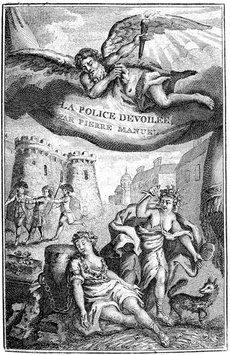 - Berbiguier’s work in the university comes under siege as the Academie des Sciences publishes a series of scathing criticisms of the man’s “gnostic pseudoscience”. Though the president’s influence keeps him from losing his job, Louis Philippe’s popularity drops as a result of his association with the man. - Condorcet arrives in the Armée des Pyrénées, where he assists in the formation of an engineering corps. These engineers are well trained in defensive fortifications, and when word of their work in the border passes spreads into Spanish territory, the Spanish generals are increasingly reluctant to make any move into French territory. - The Academie des Sciences pioneers new breakthroughs in balloon technology. They should come up with a suitable prototype by Christmas time - an excellent seasonal gift for the young French nation! - Olympe de Gouges begins a series of lightning tours across the cities of the Mediterranean coast, most directed at the rich and wealthy classes of these cities advocating support for her “Daughters of Justice” - but more generally, the entire poor class. While some make charitable donations, they see no reason to do more than that. These donations go towards rebuilding the mostly destroyed village of Signes. The villagers - those who escaped with their lives - are grateful. She also manages to win some southern royalists to her cause, though most of them are women. 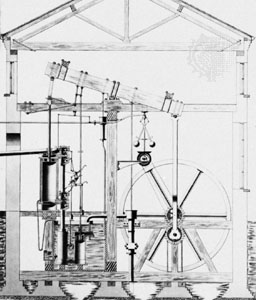 - As he writes a letter to the Irish people, speaking on the virtues of government, Robespierre observes the steam from his tea kettle blowing his paper off the table. It inspires him. Although he lacks mechanical and scientific training, he envisions a world run by steam power and invites French scientists to try their hand at making it a reality. He puts aside his letter to Ireland to write to the University of Paris and philosophes. He is informed that the Watt Steam Engine already exists. - In an attempt to regain relevancy with the general public, Robespierre launches a campaign of speeches across Paris. Not only have the Jacobins ensured the establishment of a lawful Republic, but also increased freedoms for every French citizen. While France is not exactly fond of Jacobin foreign policy, which seems to have led to a declaration of every Western state, most citizens are not willing to argue publicly with their domestic reforms. - Soon afterward, a new faction of the Jacobin Party called the Progressifs is formed. Unlike the Montagnards and Girondists, the Progressifs call for more slow reform to avoid public backlash and international hostilities. A large part of their number promote a foreign policy of appeasement, although it is not an official plank of the organization. - Marie Therese is discredited as a foreigner and puppet to the French poor and petit bourgeois following a particularly vicious ‘truth’ campaign by Robespierre. The Jacobins see her as a scoundrel who abandoned France for momentary gain, selling herself to the Hapsburg family. The rest of her detractors aren’t willing to go that far, seeing her as a poor girl who has been brainwashed by Tuffin. More moderate Republicans hope one day she might be able to integrate into France proper, as a noble citizen. - People are hiding beneath the streets, says the street. They returned shortly after Lafayette investigated, making fools of them all. There are strange whisperings all around and the issue will likely soon come to a head. Who will come out on top is unknown.  - Berbiguier continues his strange, otherworldly recruitment drive. Through this and the recruits he is bringing in, he has control of about a third of the faculty. His followers begin to seclude themselves from everyday campus activities, claiming they are doing God’s work: discovering the truth behind Greek Fire. Visitors are turned away from the laboratory. - The Jacobin Club moves from its old and now destroyed headquarters to a theoretically safer location in the outer rim of the city, close to the National Guard’s barracks. They attempt to integrate themselves with the citizen’s militia, and with Lafayette’s absence, make some significant headway. - Saint-Just steps down as foreign minister, citing irreconcilable differences between himself and the current administration. He also holds several meetings in his new headquarters, often times working late into the night on current and future legislation. - During the night, mobs storm the homes of many known National Guards, demanding they hand over their weapons as the Acquisitions Committee requires - despite orders from General Ney to the contrary. The more radical members of the National Guard are spared from these raids, interestingly enough. - Vile rumors begin to spread across France that King Louis XVI was assassinated by his brother in a cruel plot for the throne. Using elite Swiss Guard assassins, disguised as Republicans, he ambushed his brother and murdered him. The bourgeois are horrified by the implication and turn their allegiance to either the President or the missing Dauphin. Having been gone for more than a year, prospects for his survival are looking grim. Stanislav may already be the uncrowned king. 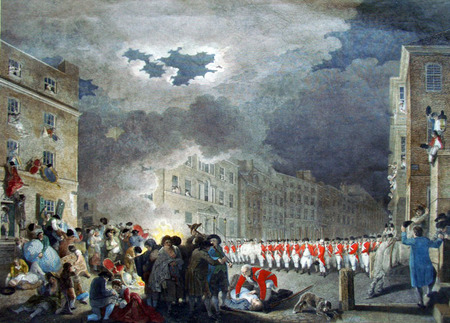 - Jacques Hébert appears without warning in Aveyron during the auction of an emigre manor house by state authorities. He violently condemns the action. The stunned officials are unable to respond as he mounts the stage and claims the peasants are being lied and swindled. The estates are REALLY begin given to the bourgeois and the peasants are being forced into serfdom. "Acquisitions" committee is already taking away peasants' horses and firearms to stop them from revolting against Emperor Robespierre I. IT IS ALL A LIE! There are a few moments of silence and then the people begin to riot. - The two government officials try to flee but are caught by the mob and physically torn apart. Their blood waters the earth, but the public are not satisfied. They march to Rodez and begin hunting down all officials they see. Hébert is long forgotten. The people are maddened, enraged! Hébert tries to get a message out about moving to Picarde but the people are long past caring. They are starved, tired and scared and don’t care who the fuck is leading them anymore. - Meanwhile, notes from Robespierre arrive in townhouses across the island of Ireland. The messages invite the Irish to rise up against their English oppressors because the French will provide aid. The Irish Catholic community in Belfast is quick to seize the opportunity, rioting in the streets as a way of demanding Catholic Emancipation. Their efforts earn them an invasion of British troops, who begin forcibly clamping down on areas believed to be harboring traitors. The Society of Irishmen is forcibly disbanded, by order of the crown, forcing the unlikely alliance of Presbyterian Intellectuals and Irish peasants to part ways. - Returning from the countryside, Hébert decides to engage in his most serious and heartfelt piece of journalism to date: a series of interviews from common people from various walks of life within Paris. In an era defined by the actions of a few rich, these pieces will be an invaluable resource for future historians. They provide context and in-sight into the mind of the common folk during one of Europe’s most tumultuous periods. The articles receive immediate praise within academic circles, but this is nothing compared to the worship Hébert will receive in 200 years. - The interviews are a short distraction and Hébert returns to his old habits. In one such article he praises the paper La Familie for being so absorbent and soft. It is surely a sign the King and his son care for the French poor for he has provided them with something to wipe the fecal matter from their bum with. It is truly a wondrous gift. If only there were not such boring words written on them. Popularity for the Orleanists and La Familie drop considerably. - Louis Philippe holds a series of rallies in Paris as he announces he will run for “re-election” as the President of the French Republic. Though he has massively soldified his support among the middle classes since assuming office, the institution of universal suffrage makes his fairly moderate policies in the midst of external threats a detriment. 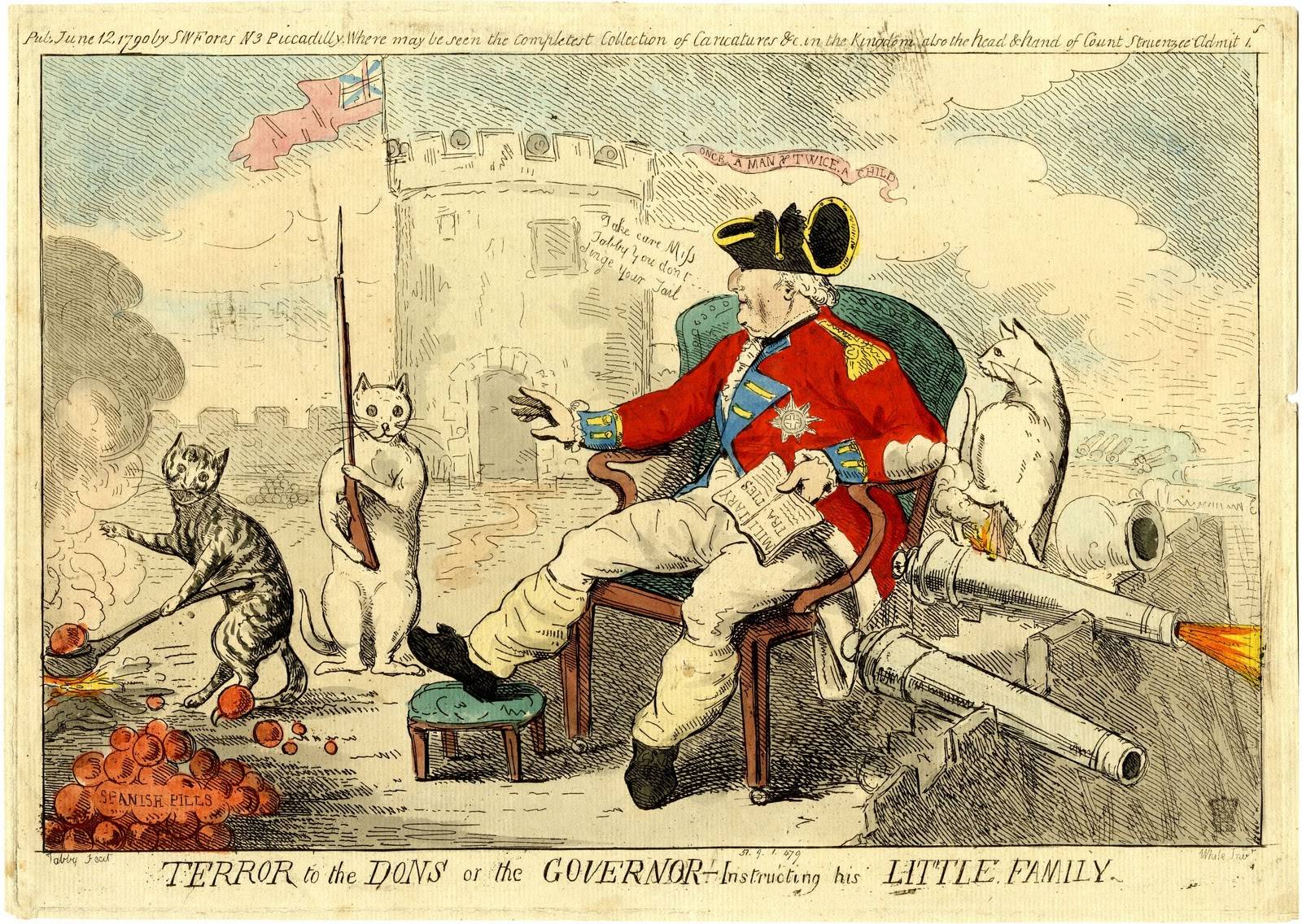 - The Breton Army finds that its wine tastes different, many finding that their soldiers are getting drunk far faster than is usual. Some believe hard liquor has been mixed with the wine. - Corsairs attempt to strike at Breton ports, but the British navy - which maintains a vigilant guard over the coast - easily repels them. These ships fly false flags, but a ship that is captured holds letters of marque from the French Republic. - Hundreds of thousands of assignats suddenly appear in towns across France, resulting in massive depreciation of French currency and sending domestic markets into a panic. Prices suddenly spike as more and more French currency are revealed, despite attempts by local officials to control them. Inflation has increased. - Just as suddenly, mass defections in the Liberation Guard begin to occur with no apparent cause. One moment the soldiers were serving faithfully and the next, order was collapsing. When people inquire, the defectors claim that Madame Gouge is a secret British agent, working from the inside to install Marie Theresa on the French throne and undo the Hundred Years War. Coffee houses take these delicious rumors and spread them far and wide to their friends. Did you hear, Madame Gouge has abandoned Republicanism! How scandalous! This undermines her prestige and overall effectiveness. 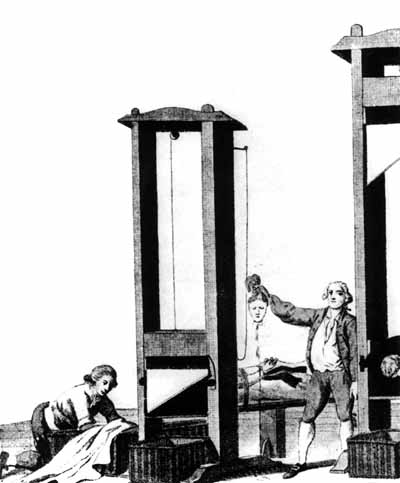 - On the first day of Summer, the summer solstice, Joseph Marie Servan de Gerbey, General of the Army of the Pyrenees, arrives in Paris in full general’s regalia with an honor guard of five hundred soldiers. The Jacobins, headed by Saint-Just, bring him to their newly renovated club and have him give an address before the people. He announces his candidacy for the presidency, and the Jacobin delegates seem to support his fairly radical platform. But as the crowd begins filtering away, he goes off-script, decrying the corruption of the May Triumvirate, the National Guard’s interference in the judicial process, and Lafayette’s continual failures as a general. The Parisian people, incensed by the moderation of the revolution, begin cheering the relatively unknown general’s name, and - armed with weapons from an unknown source - begin assaulting Orleanist deputies - those crypto-royalists! - and known National Guard commanders. Members of the clergy, ex-royalists, and moderates - all protected by the now imprisoned Lafayette - are dragged from their homes and brought to the guillotines. The mob does not disperse, burning effigies of the now dead king and Lafayette side by side. - Late in the day, the National Guard has mustered its forces, and they attempt a stand against the mob, launching volley after volley into the gathered crowd of men, women, and children. Hundreds are massacred as the blood of Parisians spills into the river Seine. But the militia is overwhelmed - some even refuse the order to fire, instead abandoning the line and fleeing into the alleys behind the Parisian streets. The power of the National Guard is shattered, and chaos now reigns in Paris. BRETON NEWS: - The Bleun-Brug blockade of France comes to an ineffective end as they are forced to retreat to safety in the wake of the renewed French invasion. Unsavory folk begin a healthy trade in smuggling goods past the British blockade, through Brittany and into France.  - A funeral service is held in Nantes, honoring the fallen King. Louis Stanislas makes certain that everyone knows he was legally named regent by the king, highlighting the role revolutionaries played in the king’s death. - The local clergy swear renewed oaths to the crown in the person of Mari Tereza I after receiving letters from the (albeit titular) Archbishop of Paris. - Despite impassioned pleas from the Archbishop, the Pope is reluctant to declare a “crusade” against the French Republic, given the vastly unpopular sentiment in most of the Enlightened world associated with the word. Instead, he issues a formal condemnation of the French government’s increasing attempts to dechristianize its populous, and particularly condemns movements to melt down church bells. - With trade flowing in to Brittany from Cornwall and across the British channel, the region experiences an upswing in prosperity, with sheep herders happier than ever! Trust in the government increases - particularly outside Nantes. - After much searching by the Archbishop, there are several suitable suitors for a Princess of France and Duchess of Brittany. According to canon law, the senior Capet - currently the Princess’ brother, in the form of his regent, Louis Stanislas - has the legal authority to void any marriage by a dynast that he has not given his approval of. In addition, the Duchess of Brittany granted Charles Armand Tuffin the right to choose a suitor for her. This makes picking a suitable mate a very delicate matter indeed. 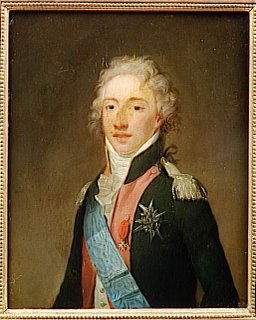 - There are several candidates available. The Breton choice is none other than Aimé Picquet du Boisguy, a young suitor who has been making attempts to catch the princesses’ eye. He is fairly popular among the Bretons, but has little in the way of legitimacy. Louis Antoine, Duke of Angoulême, is the eldest son of the comte d’Artois and Marie Therese’s cousin. He is seen as an excellent way to reunite the two divergent branches of the Bourbon family. - Duchess Mari Tereza I meanwhile makes a concerted effort to appear Breton. She hires several tutors to teach her the language, shops around at Breton shops and eats traditional Breton dishes. By the end of the few months, she appears more Breton than Tuffin himself. The Breton people applaud this but it is less liked in Paris, where the young girl’s popularity drops. - A number of servants from Marie Theresa herself are seen travelling out of Brittany and into France or Germany with unknown purpose. Although secrecy was stressed, it appears the revelation was unavoidable given the sheer attention on the young girl. - Veur Steward Auguste de Bonteville Hay engages in substantial research on economic policies and ideas over the next few months. While Brittany may be a state based on feudal traditions, that does not mean the nation much be backwards economically. The basis for these reforms is Adam Smith’s Wealth of Nations, which is translated into Breton along with Alexander Hamilton’s First Report on Public Credit. The Veur Steward petitions the Breton government for the establishment of a National Bank. A majority of the Breton people do not understand the concept but they are willing to put their trust in the man and echo his claims. 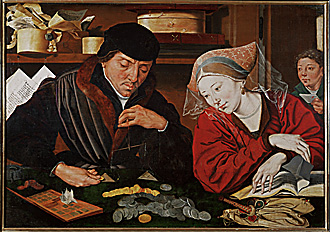 - The Court of the Exchequer is also created, largely inspired by the same ideas. The bureau is intended to oversee and manage tax revenue. The beginnings of a new tax code are put together and will be finished by Summer 1793. Tax efficiency increases slightly, but the Breton government will need to increase funding to the police in order for the full effects of these reforms to be felt. - New York businessmen, recovering from the temporary disruption of trade, look for new avenues of profit and find them in Brittany. Investment resumes, with American traders appearing in Breton ports. - Auguste de Bonteville Hay finishes these few months by publishing The Rose of Nantes, a defining piece of nationalistic fiction. The publication revives ancient Breton traditions and myths and combines them into an epic poem. The artistic worth and merit of the piece will be debated by writers for generations but for historians it is important for the unifying effect it had on Breton culture. A national identity is being cultivated. - Brittany recognizes Haiti as an independent state and begins exchanging manufactured Breton goods for Haitian sugar. The trade benefits both partners. - Using contacts on the other side of the border, Georges Cadoudal sneaks into Normandy and begins making fiery speeches in support of the Kingdom. He tries to convince the people there to rise up and restore the monarchy! As a result of language barriers, cultural issues and a lack of confidence in the First Coalition it is unsuccessful. The failure is disappointing, but Cadoudal has another idea.  - He rides to the northern shore of Normandy, where Marie Antoinette has conquered Caen, Lisieux and Le Havre due to a lack of resistance. He falls on his knees and begs the Queen’s forgiveness for failing to protect her husband. She regards him for a moment and tells him to rise. The King is dead, but hope still remains. As long as the Dauphin lives, and she is fairly certain he is, all is not lost. The Kingdom can still be restored, if not through tongue than by sword. Those who hear the statement are scared shitless. - At least until rumors that De Sade is coming to Normandy arrives and her army flees en masse. The Queen curses the soldiers as they run, some half dressed, from their camps. The area is still technically controlled by the Queen but her forces are only half of what they were initially. She remains a few days longer, ruminating on her failures both as a Queen and a Mother. She has failed to protect her children, her people and now failed to save France from total anarchy. - She writes a letter to the commanders to remain in the area and continue their support for the monarchy, whether under Marie Theresa or Louis-Charles she does not specify. Using her last remaining connections, the disposed Queen takes a wagon to Brittany. She plans to travel to Virginia next month, Emperor Short has already begged for her return. It looks like the Tale of Marie Antoinette is nearing its conclusion. - “Mayenne River” becomes a popular marching song among the Breton military, irritating many of their enemies but rallying the collective spirit of the Breton people. The song is the beat to which the new Breton forces are trained and drilled, a program du Boisguy institutes rigorously. - The Breton and British forces begin a march south to Nantes when they learn of the ongoing siege, but word soon reaches them that the French forces have departed. - Men in the northern Vendée grow increasingly agitated with French rule and officially join the Breton government in a de facto union. Some villages in Maine follow suit, expanding the borders of Brittany and bringing a large number of French speakers under its banner. They elders make clear that the arrangement is temporary until Louis Stanislas can restore his nephew to his rightful throne in Versailles. 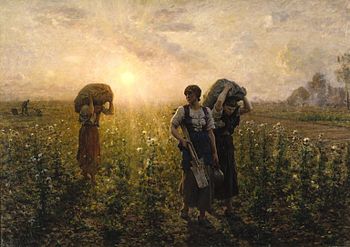 - Patriotic Breton songs, written by Tuffin himself, are spread across the countryside. There are some who accuse the Armand of just modifying old songs, but the songs nonetheless serve as a rallying cry for the Breton people. Public morale goes up and recruiting to the army increases. - Construction of the border fort Kastell Duged Breizh in Naoned finally finishes after many hard days of work. It is becoming harder and harder for the French to attack Brittany because of these fortifications. Armand Tuffin further orders the mass repairing and reinforcement of old defense, from the Old Regime era further complicating the Republican war effort. - Armand Tuffin begins to look at purchasing mercenaries to serve in a potential foreign arm of the Breton government, but his investigation reveals that there are very very few mercenaries left. Most are already in employ and those he can scrounge up are far from the elite Swiss fighting groups Brittany has come to expect from mercenaries. He goes further, looking for foreign citizens willing to defend Brittany but most potential recruits are busy protecting their own nations. The effort is largely a dud. PICARDE NEWS: 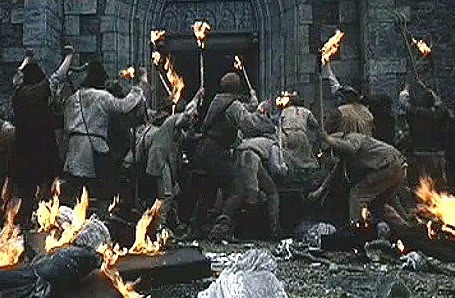 - Father Roux leads an army of 2,000 from Picarde to the Rainbow Guards stationed at the border. The soldiers are astonished by the boldfaced measures taken by the priest and struggle to react when Roux charges against them. Large numbers of the contingent are slaughtered and many more flee. The Rainbow Guard has been nearly destroyed! The roads leading into Picarde are opened. Hébert appears some time later and takes control of the abandoned Rainbow Guard fort, freeing all its prisoners and shouting loudly that the Revolution lives. - Picarde conducts its second ever elections, in both the Worker’s House and for the Presidency. Of particular note is the presence of Babeuf on the Presidential ballot. Despite his current state, many Picardians believe his election would be a message to the world at large. With 61% of the popular vote, Babeuf is elected temporal president. Hebert receives 18%. - Using gunpowder stocked from the previous winter or imported, the Picarde military begins constructing Fougasses to ensure their territorial integrity. It is a nasty weapon, fragmenting and injuring everyone is a large radius.  - With these new weapons in hand, the Picarde military makes a surprising march toward Calais. With only token resistance from the town’s National Guard, the group takes over the town and holds mock trials for its leaders, traitors of the people they are - members of the bourgeoisie are introduced to the same guillotine they had shown the aristocrats. Calais is added to the Picarde Collective. Several ships are seized, but a vast majority left port when they saw the approaching army. - Claire Lacombe makes attempts to purchase artillery. This is believed to be the origin of the oft-quoted phrase “we will shoot the bourgeoisie with the guns they sell us”. Unfortunately, the bourgeoisie know better than to sell any guns to hordes of peasants, and she finds herself without a source. - She also begins work on a new play, a highly idealized account of history of the Enrages and the founding of the Picarde Collective. While completely unappreciated by contemporaries, it will become a symbol of the collectivist revolution and the merits of struggle, no matter how hopeless. GALLIC NEWS: 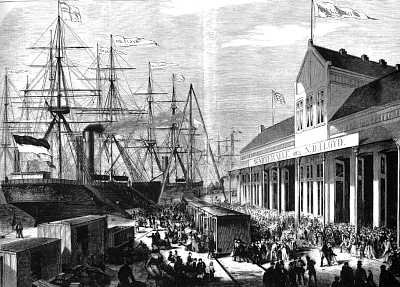 - French citizens continue to arrive in Gaule, perhaps in slightly smaller numbers than the last few months, but as apparent as ever. The ports of New Orleans are clogged with travellers either looking for refugee or opportunity. - Spain is forced out of its slumber by 4,000 French troops led by De Sade crossing into the Flordinian territories. These forces are followed by the Commonwealth of Southern America and an Indian uprising on the Peninsula. Pensacola offers its surrender as soon as it hear of the troop movements, lacking the necessary fortifications or manpower to defend itself. It is annexed by Burr. - The Peninsular Campaign proves to be far more difficult, with hundreds of troops falling ill of malaria. Although Southern Americans aided by the local Indians and 4,000 French soldiers courtesy of De Sade, mosquitoes mercilessly attack the American warriors. Their numbers are decimated. At the end of the three months, the Americans have driven out a majority of the Spanish, although they are angry that France did not offer more help. Now soldiers are discussing whether or not they want to leave West Florida. Afterall, they were the ones who conquered it. Not those inferior natives... - At the same time as De Sade’s army is marching west, Napoleon marches an army of 13,000 east into Tejas. The army has very few difficulties until it reaches San Antonio. After all, Tejas is the least populated territory in the Spanish Empire with less than two people every 5,000 veras. The only structures that break up the constant monotony are the Spanish missions and occasional undermanned fort that dot the landscape. - After a stunning victory at San Antonio by Napoleon’s forces, the colonial governors flee leaving Napoleon no one to negotiate with. Shortly before he can send out scouts to the Indian Tribes to offer them independence, he is approached by a self-appointed represented of the Spanish missions. The holy man asks Gaulian forces turn over the conquered region to them. After all, with the departure of the colonial governors the Church is the only structured organization in the region. In return, they will accept protectorate status under Gaule for 20 years, with the option of renewal afterward. - Regardless of what option is taken, Gaule will have to serve as Tejas’ protectors for the next few years. The territory has little to no soldiers of its own to draw upon to fend off opportunistic settlers or Spanish forces. - Napoleon spends one credit hiring architects and engineers to begin fortifying New Orleans and the entrance to Lake Pontchartrain. The Lake Pontchartrain fortifications are intended to be developed into a major fort called Fort Savage. Construction on the New Orleans fortifications should be done by Fall. Fort Savage will be completed by next Spring. - The allied tribes in southern Gaule pledge their arms to the cause of France and agree to help launch an invasion of the Spanish territory. Brissot leaves them after convincing them, heading northwards. Far, far northwards. - The Society of Negro-Aboriginal Amiability is founded after receiving a sizable donation from Brissot. While not abolitionist per se, it does seek to court the few gens de coleur in Gaule. By the end of Spring, the bulk of them are enrolled in the organization. - Brissot arrives, after a long trek through the rugged, only recently-thawed wilderness, in the territory of the Sioux Nation. They treat him fairly hospitably, welcoming him in grand ceremonies and treating him as a guest of honor - he reminds them of the old treaties of friendship that the French traders had signed with them, and they are eager to resume trade and alliance. - Meanwhile, de Sade and a vast number of luxury goods suddenly disappears from Gaule. No one is quite sure where De Sade has gone, until reports tell of him arriving in Normandy with a ragtag army of peasants and abducted conscripts. It is said de Sade attempted to invade Brittany right after arriving, but his men forced him to stop. They need rest and training. HAITIAN NEWS: - Haiti selects its first budget as an independent state, with the vast majority of its revenues coming from the sale of sugar stockpiles. The slave revolt has driven the price of sugar up massively, and so the slaves shall reap the rewards... so long as the stockpiles last. Tax income is far less than predicted, however. - To curb crime, a curfew is enforced in Haiti’s major cities. The cities, being fairly sparsely populated, are able to tolerate the new restriction - and the freed slaves who had previously been antagonizing the gens de couleur seem to drop off. - Military tribunals are formed, though if any independent observers were allowed into Haiti they’d likely condemn them as nothing more than show trials - corruption is rampant. The harsh penalties the tribunals hand out win Toussaint popularity among the lower classes, but the more “enlightened” mulattos wonder how strong the man’s grip on the government is. - Attacks by Baron Samedi’s now infamous zombies on the Spanish garrison in Santo Domingo cause widespread panic among the whites on the other side of the island. Several slaves break free in the ensuing chaos, and they flee into Haiti. The Spanish government demands the return of the slaves or it will invade Haiti! - Toussaint’s lieutenants reaffirm their loyalty to him at an Easter feast held in Port-au-Prince. He lightly chides them for their recent behavior, and some take it to heart - though the urge to take a little off the top still lingers close at hand. The white Charles Hector is also in attendance, and as one of the few white men on this half of the island, he draws many strange looks. - Efforts to clean the streets of Haiti continue, and the men are paid a fair wage for their work. - Charles Hector, admiral, inventor, feminist, founds the town of Les Anges on the island of Gonave, near his manor. Simultaneously the University of Les Anges is founded. Unfortunately the staff of the University consists of little more than Charles Hector himself and whatever volunteers he can scrounge up, lacking any funding whatsoever. Still, it serves as an important first step in building an academic tradition in Haiti. Hector invites inventors from all over the world to come to Les Anges, but only a small minority choose to come. Racism still remains a major hurdle. - Hector is unable to come up with any new inventions or theories in his laboratory. A number of different approaches are tried, but with little success. There is spilled milk everywhere. He curses the heavens and goes out for a drink. Turns out, science is hard. - Instead, he goes and builds a larger version of his volaic pile. It can be used to power machines effectively and becomes the envy of the scienfitic world. They beg Hector to return to civilization, or at the very least send them his blueprints to reproduce the device. - Hector also tinkers with designs he has for the Watt Steam Engine. Adjustments are made here and there, but the whole process is experimental. Charles Hector will need investment, either from the Haitian government or private individuals, if he is to test it. Investors should be cautious though, there is no guarantee of success. 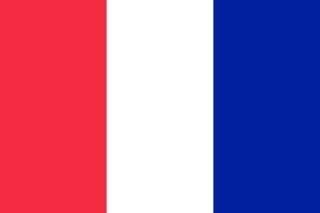 FOREIGN NEWS: - Dutch forces move immediately to the border with the Austrian Netherlands in an attempt to hold a line against a predicted invasion by Massena. The patriottes in Massena’s army clamor for an invasion of the so-called republic! - The small army of foreign officials arriving in Constantinople is named Pashites by government officials during a private party. What was originally intended as a jest, grows in popularity, until it enters the common lexicon as “soldiers and officials serving in a foreign government”. As for the Ottoman Ambassador himself, he directs them to continue training the Ottoman armies at large. His efforts are mitigated by the fact that very few soldiers remain in place for long. It is difficult to teach someone when they are constantly on the move.  - Unfortunately, these recruitments have consequences for the Ambassador. The Sultan receives a note from the Ottoman Ambassador in France, suggesting the nation expand their operations to Poland, recruiting officers from the dismantled Polish army. The Sultan is quick to voice his opposition to such a proposal, letting the Ambassador know that such an act would likely lead to war with Russia. The Sultan’s janissaries are able to intercept the Ambassador’s letter and publish it to fuel their on-going battle with the nation’s government. Reaction on the Istanbul street is not kind and Russia sends their forces to the border as a signal to the Ottomans to stop. - The Ottoman Ambassador to France makes a number of speeches condemning Russian and German atrocities, further exacerbating tensions. This forces the Ottoman Sultan to send a delegation to Russia for the explicit purpose of avoiding war. Conflict with Russia would be suicide, according to Selim III. - Royalist agents are seen operating in Switzerland, asking a number of questions and forcibly demanding answers from Swiss authorities. What they seek is anyone’s guess, but the Swiss government itself has few answers. - The comte d’Artois flees from the path of the encroaching French armies, taking shelter in the Electorate of Hanover, from which he will later seek passage on board a ship to Britain. 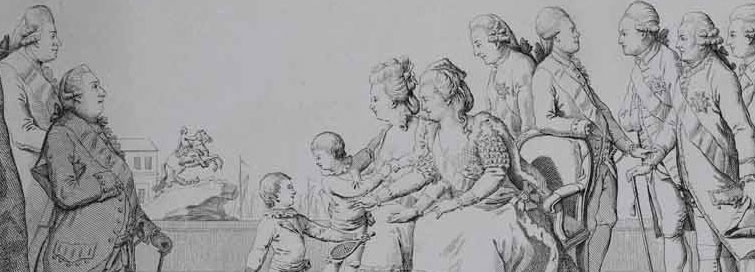 - A state visit by members of the Ottoman government to Russia in an attempt to reduce tensions articulates the threat more clearly. Everywhere the Ottomans go, they are escorted by a dispatch of at least forty heavily armed Russian soldiers. When they visit the Russian palace to speak with Catherine the Great, the Tsarina is situated on a tall chair forcing the diplomats to stare up at the Empress. Catherine could destroy the Ottoman government with a flick of her wrist and she hopes the Ottomans understand that quite clearly. They should avoid aggravating the Russian government in their future actions. - One Ottoman diplomat is thrown out of the nation after allegedly attempting to woo Catherine the Great. An investigation is ongoing, but it appears the official snuck into Catherine’s private quarters and positioned himself on her bed sheets, completely nude. Matters become extremely unpleasant when it is Paul I of Russia, not Catherine, who enters the room first. - As the foreign ministry struggles with a response to this debacle, Ottoman culture receives a shot in the arm. Archeologists are sent to Egypt to study and hopefully collect ancient relics. The Small Temple of Rameses II in Abu Simbel is cleared by local Egyptian laborers under the command of the head of the Istanbul Museum. - The Ottoman Empire begins redirecting all their trade away from France and to the United Kingdom, further hurting their further ally. Although goods rarely got through the blockade, they have now stopped altogether, leaving France in economic turmoil. The British are largely impassive about this. The Ottomans are hardly their largest trading partner and if it came to war, they could survive without them. - Learning from their past mistakes, the Austrians send a force of 30,000 into Serbia during favorable weather. They intend to end the war with the Turks as soon as possible so they can focus on France. The strategy seems to work. The Ottoman forces are smashed to pieces, and forced to withdraw. The Hapsburg eagle is seen flying over Sarajevo. - His Royal Highness Archduke Francis of Austria passes on April 19th from injuries sustained during the Battle of Brussels as his wife delivers a child in the other room, cursing God for his cruel irony. He is buried in Vienna and the nation stands in mourning. Although the Holy Roman Empire is technically elective, the heir apparent is likely His Royal Highness the Grand Duke of Tuscany Ferdinand III. - Several French spies are caught trying to infiltrate Prussian and Austrian camps in the Rhine and Netherlands. They are executed on the spot. Several defective cannons and recent tactical failures seem to suggest that all were not caught though. - Pro-Jacobin periodicals appear on the streets of London, published by sympathetic Englishmen and displaced Frenchmen. They argue on France is an inviolable union and that Republicanism is a legitimate political ideology. These periodicals have a very small audience, given the current war with France, and has no support in Parliament. - Sweden continues to expand its trade operations with France and its successor states including Brittany and the increasingly independent Gaule. The Ottoman Empire is also the subject of significant investment, Swedish consumer confidence increased following their victories against the Holy Roman Empire. The flow of money into Stockholm allows King Gustav IV Adolph to expand the army and industry.
|
| # ? Dec 4, 2012 04:21 |
|
La Nation, la Loi, le Roi- A France NationSim Country: République française (French Republic), established 20th of September 1792 by the ratification of the constitution by the Emergency President of the Legislature and the provisional President of France. Population: 28,000,000 as of the last census (1790) Year: Summer 1793 (turns represent 3 month seasonal cycles) Metropolitan France 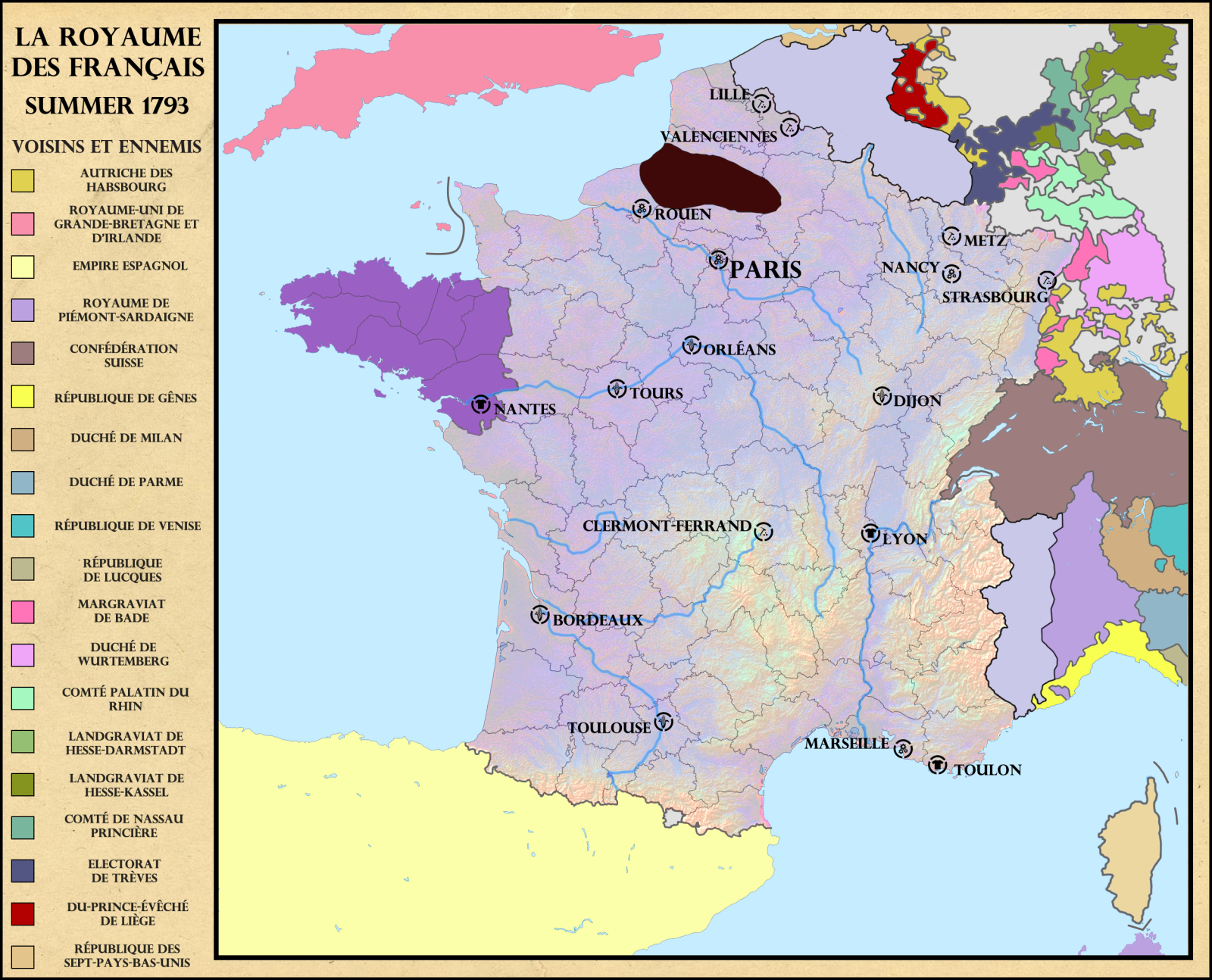 1600x1294 =Economy= - =Economic Sectors= Agriculture: 83% Manufacturing: 10% Trade: 7% Growth Rate: 0% = Unemployment: 18% =Government= 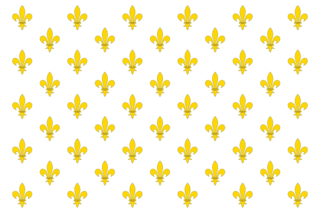 320x213 The Constitution of 1793 is a provisional document, most of it untested. - Popularity: Somewhat Poor System: Unitary Republic 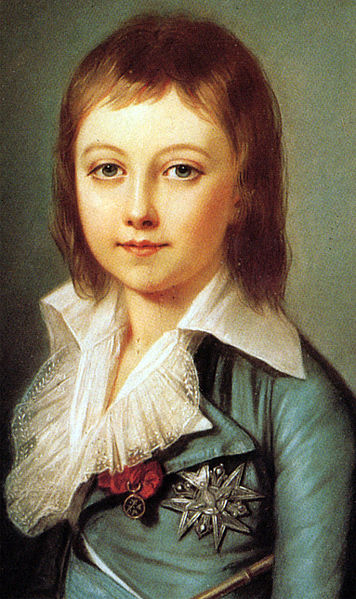 356x599 Legitimist King: Louis XVII de Bourbon (unplayable)
Supporters: Nobility, Emigres, Moderates Laws of Succession: Agnatic Primogeniture Heir Apparent & Regent: Louis Stanislas Xavier, comte de Provence/Takanago (ktakanago@gmail.com)  221x250 President: Louis Philippe , “Citoyen Egalité”/Colonel Wood (sacolonel.wood at gmail.com)
Supporters: Petit bourgeoisie, Jacobins 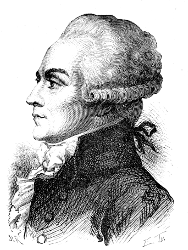 188x250 Prime Minister: Maximilien de Robespierre/sniper4625 National Assembly: 700 Seats (422 Jacobins, 187 Orleanists, 91 Independents) Elections: Members of the National Assembly are elected every year on a national basis. There is one deputy for every 40,000 citizens. President is elected every four years. Suffrage: All men over the age of 21. =Foreign Relations= Holy Roman Emperor: War/Bad Prussia: War/Bad Great Britain: War/Very Bad Russia:: Peace/Bad Poland-Lithuania: Peace/Good Spain:: War/Very Bad Sweden: Peace/Mediocre Denmark-Norway: Peace/Bad Brittany: War/Extremely Bad Portugal: War/Mediocre Sardinia-Piedmont: War/Bad Naples/Sicily: Peace/Bad Dutch Republic: War/Bad Switzerland: Peace/Mediocre Ottoman Empire: Alliance/Good USA (in New England): Trade Agreement/Mediocre USA (in New York City and New Jersey): Trade Agreement/Extremely Bad USA (in Virginia): Trade Agreement/Poor USA (in South Carolina): Trade Agreement/Good Republic of Vermont: Neutral Commonwealth of Southern America: Extremely good =Cabinet= The choice and dismissal of Ministers appertains solely to the President. The members of the Legislative Assembly may not be appointed. All powers exercised by the President must be approved by at least one other minister before it can take effect. Most minister’s executive privileges have been temporarily suspended. Minister of Foreign Affairs: Vacant (PRESIDENT MUST APPOINT) The Minister of Foreign Affairs is tasked with maintaining relations with foreign nations and the protection of French citizens abroad. Given the sheer number of war declarations coming in daily, he is doing rather poorly.  246x250 Minister of War: Gilbert du Motier, Marquis de Lafayette/ a bad enough dude (ehoovestol@gmail.com) (CAPTURED) The Minister of War has total control over the French Army and is responsible for the protection of French border provinces. Given international hostility toward France, the execution of this duty may be difficult. Minister of the Marine: Vacant (PRESIDENT MUST APPOINT) The Minister of the Marine has jurisdiction over all seafaring French vessels and the colonial territories. It is his duty to ensure the protection of trade. 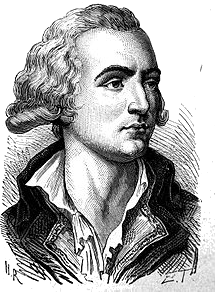 215x292 Minister of Justice: Marguerite-Louis-François Duport-Dutertre/ZearothK (zearothk@trioptimum.com) The Minister of Justice is responsible for all judicial affairs within France and ensuring the rule of law is maintained. Minister of Finances: Vacant (PRESIDENT MUST APPOINT) The Finance Minister is charged with maintaining state finances, agriculture, industry, commerce, roads and estates. Due to the poor state of the French economy, the position is in a state of turmoil and officials here rarely last long. =Factions= 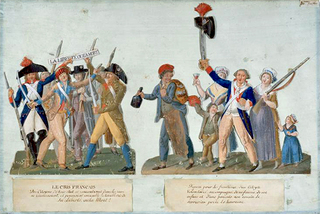 320x214 - Club des Jacobins  237x250 Radical Republican (Montagnard) wing led by Louis Antoine Léon de Saint-Just/Epicurius (epicurius at aol.com). Liberal Republican (Girondin) without leadership, most fled. Faction is predominantly Montagnard. The Jacobins are the radicals of the French Revolution. They now call for increasingly extreme measures, like the abolition of the Catholic Church and the extermination of all enemies of the state. Their headquarters has been destroyed in a mysterious bombing. Represented by the colour red. - Parti Orléanist 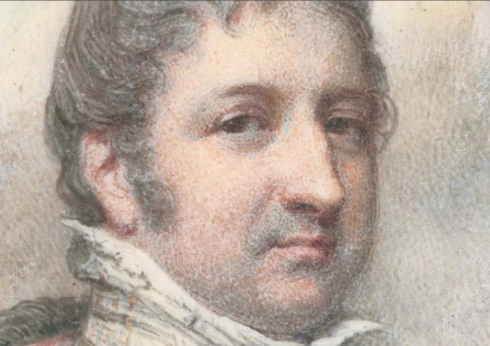 490x346 Conservative wing led by Louis Philippe de Bourbon/vacant, Moderate wing led by the Marquis de Lafayette/a bad enough dude. The Orléanists have adapted somewhat well to the changing situation in France. They are divided into two factions, with one supporting a gradual and steady move to constitutional monarchy under the House d’Orleans, and the other advocating a moderate, liberal republic. - Monarchistes Français 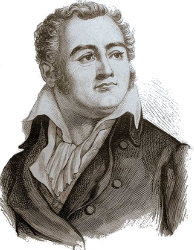 194x250 Reactionary Monarchist, led by Georges Cadoudal/Arujei (rjohnlennon@gmail.com) (OUTLAWED) Although they are not represented in the Legislative Assembly, this group represents an alliance between members of the former aristocracy, who wish to see a return of the absolute monarchy and landed aristocracy, and marginalized minorities like the Bretons who chafe under the centralization of the state. Although many fled following the ratification of the Constitution, those who remain in France have strong funding from outside parties. Now, the monarchists are based primarily around Brittany, though they have substantial support in northwest France. - Les Enragés 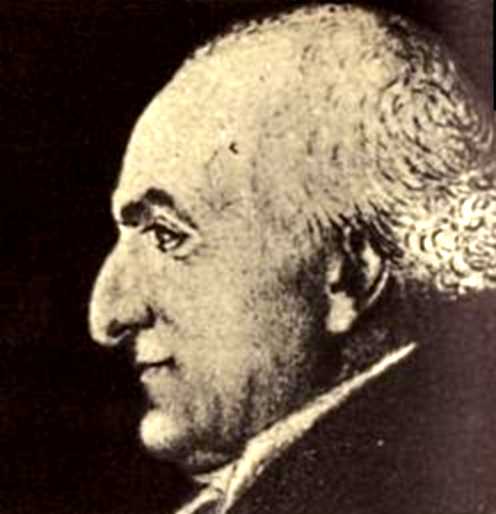 496x514 Babeufist (Populist Left), led by Jacques Roux/Stalingrad (stalingradlenin@gmail.com) (OUTLAWED) The crippling bread prices and a general lack of work in Paris have given some popular support to a movement that might otherwise have been a footnote of history. Even more radically left than the Jacobins, the Enragés rely on the support of the common man and encourage a thoroughly radical revolution. With the death of Babeuf and the betrayal of Madame Gouges, they rely solely on Roux for leadership. Departments: Following the ratification of the French constitution, the provinces of France were destroyed and the lands of the aristocracy dissolved. In their place, the Legislative Assembly established 82 departments. Each department is ruled by an Administrator and receives three representatives in the Legislative Assembly, except Paris which receives only one. =Newspapers= L'Ami de la France Editor: Louis Philippe d’Orleans the Younger Ideology: Orleanist Readership: Middle class, some readers in the aristocracy. Headlines: “THE SERVANTS OF THE REVOLUTION: A TREATISE, ON WHY GIVING UP MUST NEVER BE AN OPTION” L’Ami du Peuple 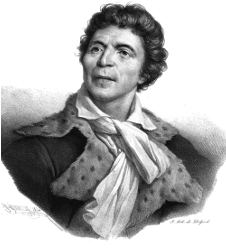 226x250 Editor: Jean-Paul Marat/vacant Ideology: Radical Republican Readership: Middle class exclusively. Headlines: “CRUSH THE REACTIONARIES, PURGE THE GRADUALISTS, KILL THE ENEMIES OF FRANCE” Le Père Duchesne  438x600 Editor: Jacques Herbert/SexyBlindfold (estafortaleza (at) gmail (dot) com) Ideology: Radical Republican Readership: Urban poor, Parisian lower class. Headlines: “FUCK, FUCK, FUCK, FUCK, FUCK: A SERIES OF ESSAYS” Breiz Atao Editors: Georges Cadoudal and Armand Tuffin Ideology: Breton Nationalism Readership: Bretons, aristocracy, some supporters in France Headlines: “LAFAYETTE, LAFAYETTE, WHERE ART THOU LAFAYETTE?” =Military= 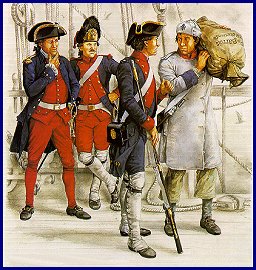 256x270 The French military has initiated major reforms since the establishment of the Republic. Although France still struggles from defections and difficulty training soldiers, these problems are slowly being resolved. At the moment, France’s most pressing concern is the First Coalition who threatens to destroy the nation and its people. Grande Armée de la République 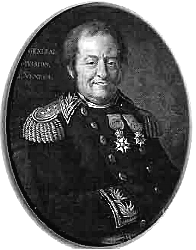 196x250  194x250 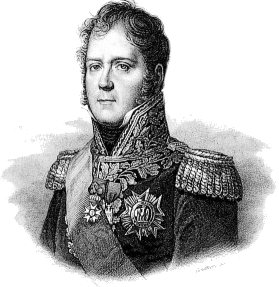 279x287 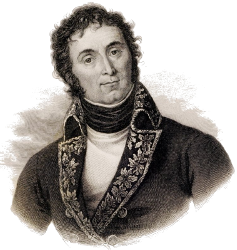 237x250 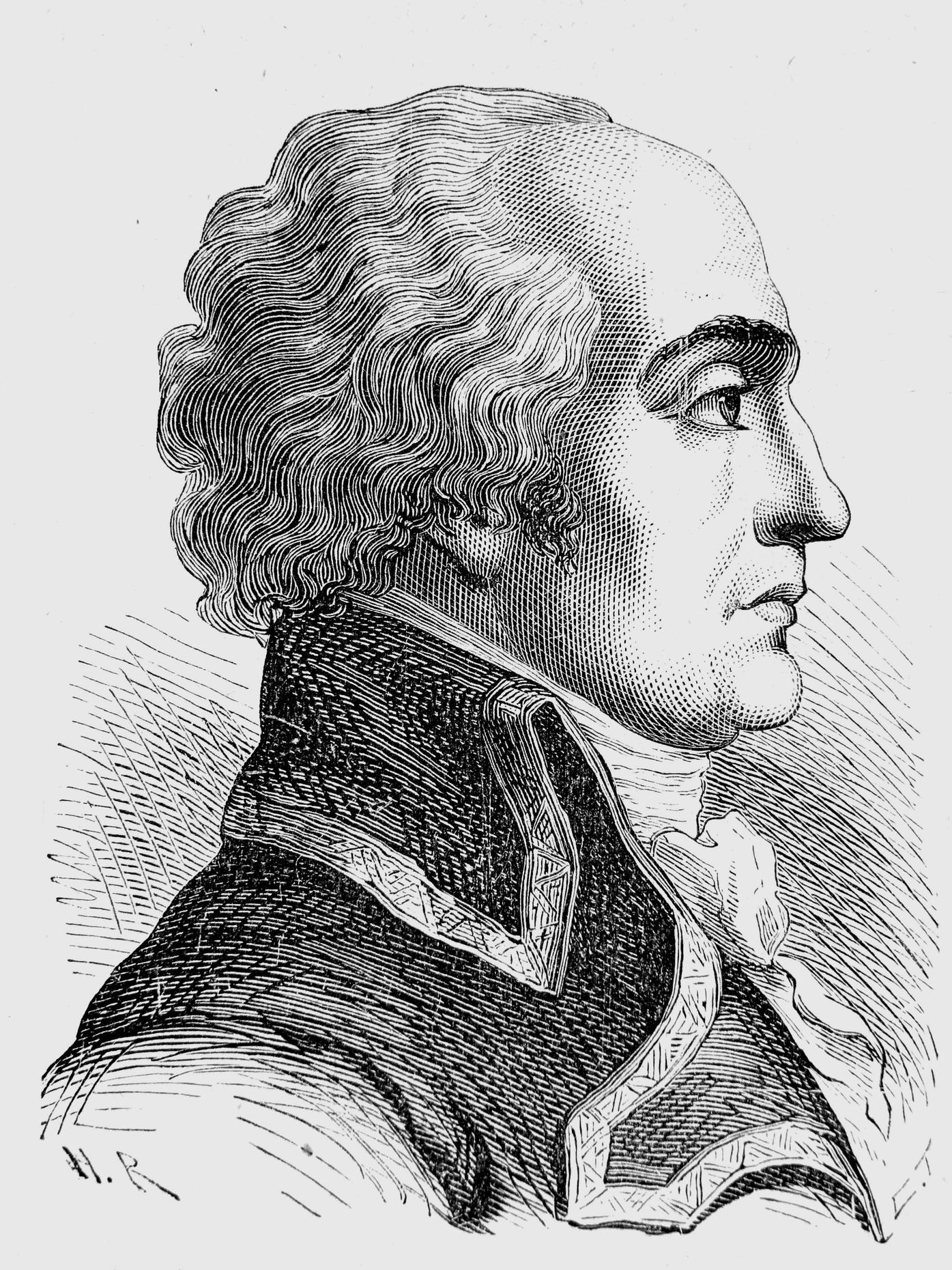 1395x1860 Maréchal de France: Alexis Le Veneur de Tillières/AndItsAllGone (anditsallgone@gmail.com) Forces: 300,197 soldiers, 16,353 cavaliers, 324 cannons --- l’Armée du Nord [66723 soldiers, 500 cavaliers, 50 cannons. Brussels. commanded by André Masséna/Viscardus] --- l'Armée du Rhin [44758 soldiers, 3612 cavaliers, 50 cannons. banks of the Rhine. Alexis Le Veneur de Tillières/AndItsAllGone (anditsallgone@gmail.com)] --- l’Armée Expéditionnaire [17345 soldiers, 30 cannons. North. Napoléon Bonaparte/YF-23 (yfaltmiau at hotmail dot com)] --- l’Armée du Centre [54847 soldiers, 1,000 cavaliers, 24 cannons. retreating to Bordeaux. no commander] --- l’Armée des Pyrénées [35000 soldiers, 5000 cavaliers. stationed at Spanish Border, Général Joseph Marie Servan de Gerbey/A RICH WHITE MAN] --- l’Armée des Alpes [47512 soldiers. stationed at Grenoble, Général Michel Ney/rakovsky maybe (rakovskymaybe@gmail.com)] French Navy 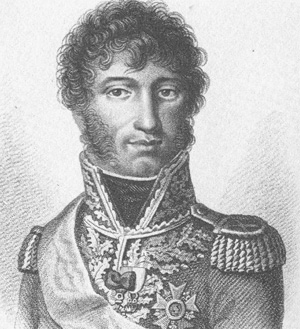 300x329 Admiral: Joachim Murat/stalin-chan (stalin@c0balt.com) Forces: 66 ships of the line, 61 frigates, 45 corvettes, sizable merchant marine Organization: 2 fleets, several smaller patrols --- Flotte de l’Atlantique [assigned 35 ships of the line, 30 frigates. Blockading Brittany. commanded by Louis Thomas Villaret de Joyeus/vacant] --- Flotte de la Méditerranée [assigned 31 ships of the line, 26 frigates. based in Toulon. commanded by Louis-Armand de Rohan Constantine/vacant] Situation: New command structure, many remaining officers skeptical. Many vessels in disrepair. Swiss Guard 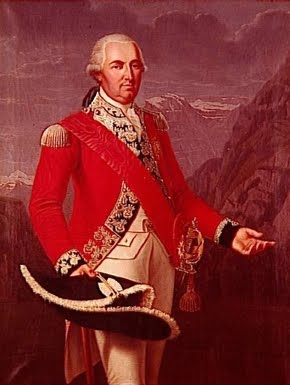 290x385 Oberst: Major Karl Josef von Bachmann/Enjoy (sw_faulty at hotmail dot com) Forces: 130 guardsmen (in prison), 100 guardsmen with the Dauphin Situation: Highly trained, highly effective mercenaries serving as the King’s personal guards. Their forces were recently shattered by the National Guard in an assault on the Royal Palace. The Swiss government is outraged by the slaughter of their citizens and struggling on how to respond. National Guard  246x250 Commander-in-Chief: Gilbert du Motier, Marquis de Lafayette/ a bad enough dude (ehoovestol@gmail.com) (CAPTURED) Forces: 12487 National Guardsmen, 12 American advisors, 12 cannons Situation: Utterly shattered after devastating revolt thanks to Lafayette’s sudden disappearance. Most National Guards are the targets of retribution =Foreign Threats=  416x599 L’Armée des Princes Commander: Louis Stanislas Xavier, Regent of France and Navarre Sponsors: Prussia, HRE, Great Britain Forces: 2485 Gallowglass mercenaries, 6717 infantrymen, 1530 cavalrymen and one squadron of hussars Situation: In Brittany. Excellent training, poor morale. Well-armed. Queen’s Association Commander: Various, disorganized Sponsors: Quebecois wealthy, American and British intellectuals Forces: 700 fighters (Montreal), 500 fighters (Philadelphia), 175 fighters (London) Situation: Extremely well-armed and high morale, but non-existent training. ‘Fighters’ consist solely of armchair intellectuals and bored upper class. =Rebellions and Militias= Babeufist Farmer’s Revolutionary Collective Leader: Gaius Gracchus, Tribune of the People/vacant Ideology: Babeufist Popularity: 15% in Picardy Forces: 4301 peasants, 25000 theoretically available for mobilization Situation: Organized following the death of Babeuf and the uncertain future Babeufists face in France. Some support undercut by the Land Reform act. Ar Diebiñ Bretoned Leader: Georges Cadoudal Ideology: Breton Nationalism / Conservatism Popularity: 35% in Brittany Forces: 3890 peasants, 40 noblemen Situation: Recently distributed muskets and farming instruments. Aid from unknown source has stopped due to blockade. Some training. Great morale. La Garde Liberatione Leader: Olympe de Gouges Commanders: Olympe de Gouges Ideology: Women’s Liberation Loyalties: Mostly Enragés, with some Jacobin sympathies Popularity: 3% in Marseilles, 1% in Toulon Forces: 387 sans-culottes, 427 “working women” Situation: Volunteer militia formed after the March on the Champs-Élysées, made up of disenfranchised peasants and artisans. After betraying Babeuf, many deserting the organization! La Garde Libre/The Cambions  250x250 Commander: Donatien Alphonse François, Marquis de Sade/Fall Sick and Die (ccferrara@gmail.com) Ideology: Far Left/Anarchism Popularity: 2% in Paris, 10% in Gaule Forces: Unknown Situation: Where are they... ? Normandy... ? Not many are sure, but all tremble in fear. Especially Bretons. Haiti Leaders: Several, in disarray 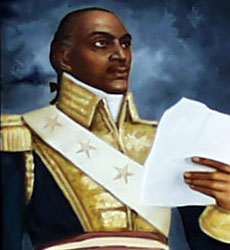 230x250 Commander: Toussaint Louverture/EccoRaven Ideology: Abolitionist Popularity: 85% among black Haitians, no support in Metropolitan France Forces: 28,210 slaves, 3 cannons, 1 mortar Situation: Morale is very high, training is mediocre but improving. Occupying all of Saint-Dominique. Other Important Individuals and Groups: Archdiocese of Paris With the confiscation of church property and the subjugation of the clergy to the state, the influence of the church hierarchy on France is theoretically minimal at best. In reality, however, many voiceless Catholics still place their church first, and no one is in so good a position to take advantage of that trust as the Archbishop of Paris. 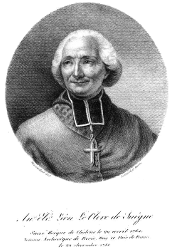 173x250 Archbishop: Antoine-Éléonor-Léon Leclerc de Juigné/Cozy Hemp Mines (Cozyhempmines at googlemail) American Embassy to France Although he may not wield significant power on the European stage, the American ambassador and his government serve as symbols of democracy and republicanism. He has gotten himself into a spot of trouble with the Jacobins as of late. Matters are further complicated by the destruction of his embassy. 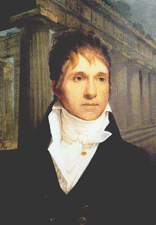 Ambassador: William Short/Tao Jones (sa.taojones at gmail) Swedish Embassy to France The Swedes would seemingly be an irrelevant power were it not for their potential to counter the Russian threat to France.  200x273 Ambassador: Gustaf af Wetterstedt/Hutter British Embassy to France Along with setting British foreign policy concerning France, the current ambassador also has a vast amount of personal wealth to draw upon. 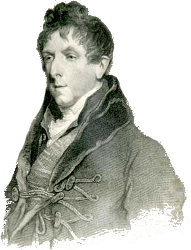 191x250 Ambassador: Duke George Leveson-Gower/Incy (incysa at gmail) Prussian Embassy to France The Prussian ambassador is among the most virulent of enemies of the French state.  191x250 Ambassador: Friedrich-Wilhelm von Franco/Ramba Ral Ottoman Embassy to France The Ottoman Empire is a far off land for most French citizens and a second rate power for most of their leaders. Perhaps their ambassador can change this attitude.  311x640 Ambassador: Koca Yusuf Pasha  209x247 Claire Lacombe/Rincewind Noted feminist and playwright, Lacombe is certain to be an entertaining character of the Revolution. 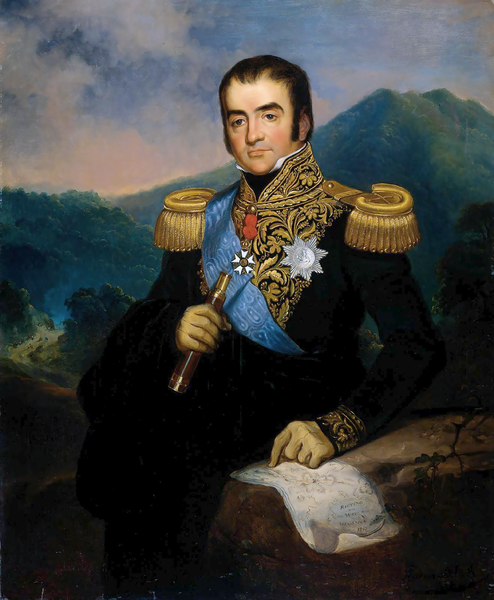 494x600 Herman Willem Daendels/Brutus Salad (xerxes.ihatespartans@gmail.com) Leader of the Patriottes faction outside of the Netherlands, he seeks the overthrow and end of the autocratic Dutch Republic and the institution of a true republic in the region. To this end, he has cast his lot in with the French. 420x600 Marquis de Condorcet/Diplomaticus A leading thinker in an informal but increasingly solid intellectual and scientific movement, whose members are commonly called “Les Philosophes”. A scholar, theoretician, and philosopher. 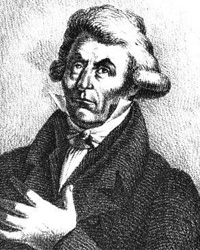 200x250 Alexis-Vincent-Charles Berbiguier de Terre-Neuve du Thym/Sword of Damocles (praeaton@gmail.com) A “demonologist”, this man is in the emply of the university and his association with the President is a frequent target of vitriol. 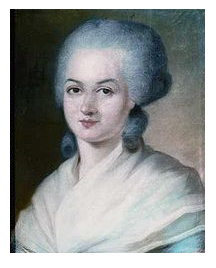 216x268 Marie Gouze/Maxico Roberto (maximo . roboto on Gchat) Although initially in support of the Revolution, Marie Gouze was disenchanted when she learned women would not be allowed to participate. She is an influential writer in Paris but extremely controversial. 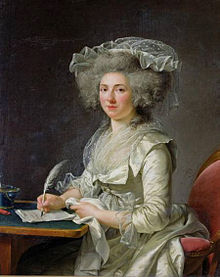 220x277 Madame Roland/vacant The wife of noted Jacobin Jean-Marie Roland, the Madame exerts a great deal of influence over her husband and through him the members of the Legislative Assembly. 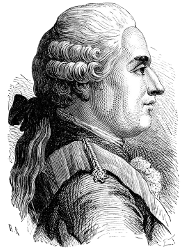 183x250 Louis Stanislas Xavier, comte de Provence/Takanago (ktakanago@gmail.com) The younger brother of the King of the French and the de facto leader of the émigrés outside France. His recent declaration of regency is a threat to the stability of the country and is currently recognized by most of Europe, as well as the King himself. =Stats= 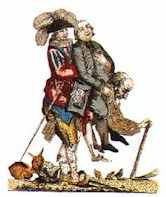 Agriculture: Undercapitalized with below average average crop yields. Poor harvests have lead to unfavorable conditions for local markets. Situation was improving, but blockade means France will have to be self-sufficient. Industry:: Mostly textiles, with some mining and metalworking. Stabilized somewhat by ample subsidies and an influx of cotton from America. American markets also proving quite amenable to French manufactures, but British blockade threatening to rob this avenue from France. New projects in the Rhine completed, bringing in massive immigration and industrializing the region. Food: Mild famine has resulted in a massive spike in prices but agricultural investments have resulted in a minor improvement in diet. Brittany is struggling heavily but surviving. Nobility and bourgeois eat well. Diet quality in Paris is on the decline. Labor: No restrictions on working hours or hiring practices Education: 47% literacy for men, 35% for women. Based on the apprenticeship system, with Catholic seminaries being used as an alternative for poor families. Some seminaries expanding admission thanks to education budget increases. Private tutors used for nobility. Public Health: Major cities contain small sewers but require updated water systems. Health care largely provided by the clergy, who now receive funds from the state for that purpose. Crime: Approximately 3,660 officers are used to defend strategic sites like the palace, royal mint and major roadways. Well-organized and trained but corrupt. Trade: Forced to turn to conquest as a means to secure the flow of goods into France. Colonies: Mostly in the Caribbean and India, holdovers from numerous unsuccessful wars against Britain. Most are occupied by the British, with the notable exception of the fairly prosperous seized colony of Gaule. Finance: Assignats have largely replaced the livre as the de facto currency of France. Inflation steadily increasing thanks to Robespierre’s budget and sovereign default. Urbanization: Less than a quarter live in cities. Population growth primarily in rural areas. Religion: Catholics dominate political life but Calvinists and Jews are tolerated. The Civil Constitution of the Clergy makes priests direct employees of the state. Ethnic Groups: 53% French, 46% Occitan, 1% Corsican. Official toleration of local languages but increasing momentum towards French as the sole language of the state. =Budget= Due to the poor economic policies of the monarchy, the treasury of France was bankrupt by the time the Constitution was enacted. In order to ensure economic stability, church property was forcibly seized and used as a standard for the currency. Despite the decrease in royal power, a large portion of the yearly budget was used to build and maintain the property of the nobility. As a consequence of underfunding the police and low accountability among tax collectors, Revolutionary France often had difficulties collecting taxes. quote:Budget Kentoc'h mervet eget am zoatran- A 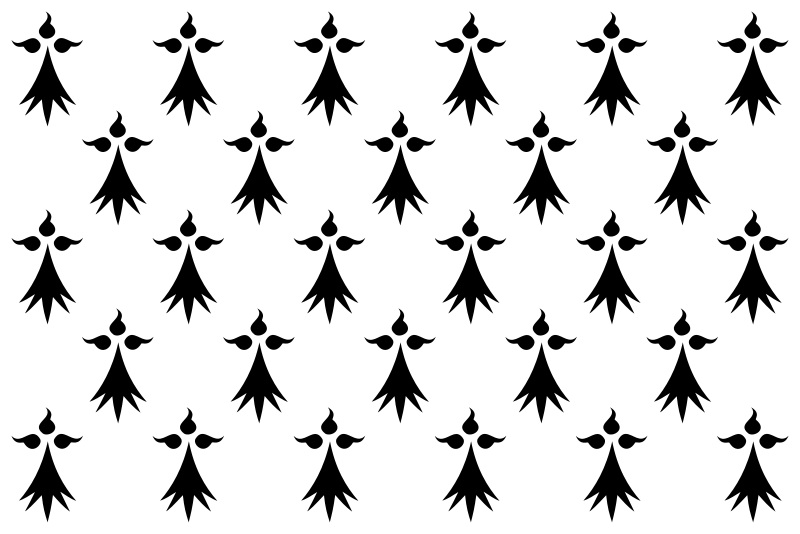 800x534 Country: Ar Dizalcʼh Votadeg Dugelezh Breizh (The Independent Elective Duchy of Brittany), established 8 November 1791 by the ratification of the signing of the Breton Declaration of Independence Foreign Relations: Excellent relations with the United Kingdom, great relations with the Papal States, good relations with Prince-Bishopric of Liège, neutral relations with the United States, at war with the French Republic Population: 1,680,000 Year: Winter 1792 (turns represent 3 month seasonal cycles) Metropolitan Brittany  440x317 =Economy= =Economic Sectors= Agriculture: 88% Manufacturing: 12% Trade: 0% Growth Rate: 2% = Unemployment: 15% =Government=  320x213 Popularity: Good System: Unitary Elective Duchy  204x250 Duchess: Mari Tereza I ar Vourboned/Gantolandon
Laws of Succession: Agnatic-Cognatic Elective Heir Apparent: To be decided. Noble Assembly: 145 Seats (120 Marians, 20 Independents) Popularity: Mediocre Steward of the King: Charles Armand Tuffin, marquis de la Rouerie/Gorgo Primus Elections: No elections held. Suffrage: None at the national level. Nobles cast votes for Duke upon the death of the preceding Duke. =Royal Council of Brittany= The Royal Council of Brittany was created on 5 November 1792 with the goal of improving administration within Brittany. Although technically membership is determined by the Duke of Brittany, in practice the Steward of the King is responsible for the body and its upkeep.  194x250 Veur Chancellor: Georges Cadoudal/Arujei (rjohnlennon@gmail.com) The Veur Chancellor’s duties are strongly based off the position of Foreign Minister in the French government. He is charged with diplomacy, foreign affairs and maintaining national morale. As a newly established nation, Brittany’s primary goal will be to gain recognition by other states.  185x250 Veur Marshal: Aimé Picquet du Boisguy/Rogue The Veur Marshal represents a revival of ancient feudal tradition. With a focus on military matters and war, the marshal’s responsibilities are all that stand between independence and annexation.  200x274 Veur Steward: Auguste de Bonteville Hay/TaoJones Unlike France, Brittany has few economic woes. It is a new nation, with bright economic prospects ahead of it. The Steward determines the budget, oversees tax collection and ensures the authorized use of funds.  194x250 Veur Spymaster: Georges Cadoudal/Arujei (rjohnlennon@gmail.com) In most states, the ‘secret service’ does not constitute an official part of the government and exists in a legal grey area. Not so in Brittany. Overseer of all domestic and foreign intelligence, the spymaster serves as the official eyes and ears of the government.  173x250 Veur Chaplain: Titular Archbishop Antoine-Éléonor-Léon Leclerc de Juigné/Cozy Hemp Mines (Cozyhempmines at googlemail) The Chaplain is responsible for matters of religion and culture within Brittany and is the Catholic Church’s foremost representative in Brittany. The position is an interesting one in that it is not subject to government regulation and appointment appertains solely to the Pope himself. Other Important Individuals and Groups: =Stats=  Agriculture: Poor, farm focused economy. Slow improvement because of foreign imports and exports Industry: Exclusively textiles. It is not clear whether Brittany qualifies for the Free Trade Compact with the US, as such rates of sale tends to vary drastically Food: Although food is scarce, the situation is improving thanks to British and Ottoman aid as well as government food programs. Labor: No restrictions on working hours or hiring practices Education: 39% literacy for men, 28% for women. Based on the apprenticeship system, with Catholic seminaries being used as an alternative for poor families. Private tutors used for nobility. Public Health: Major cities contain small sewers but require updated water systems. Crime: Underfunded system in place for crime and punishment. Remnants of the old French system still in place but barely functioning Trade: Limited trade with foreign nations thanks to ineffective blockade Colonies: No interest in colonies, especially in a time of crisis. Finance: Lack of trust in new currency, the Breton florin, exclusively minted in Breton provincial capitals. Urbanization: Less than a fifth live in cities. Population growth primarily in rural areas. Religion: Catholics dominate political life. Religion reasserting authority under Breton homerule. Ethnic Groups: Mostly Breton, with Frenchmen clustered on the border. Sporadic attacks occurring on French speakers have finally stopped. =Military= Army of All Brittany General: Charles Armand Tuffin, marquis de la Rouerie/Gorgo Primus Forces: 3480 soldiers, 300 cavaliers Organization: None Situation: Good morale, decently trained. About half of the men have arms fitting their duties. Sharpshooter regiment has experimental new rifles. =Budget= quote:Contributions Directes: Liberté ou la Mort - A Haiti Nationsim Year: Winter 1792 (turns represent 3 month seasonal cycles)  500x250 Country: Haïti Population: 510,000 Capital: Port-au-Prince Other Major Cities: le Cap, St-Marc, les Cayes, Jacmel 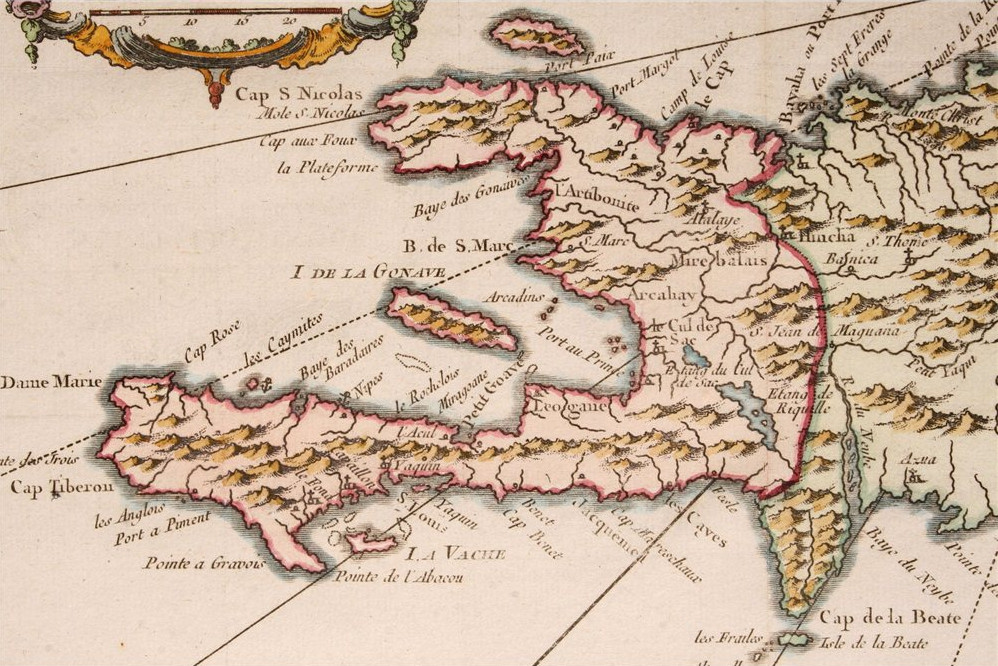 998x666 =Economy= - =Economic Sectors= Agriculture: 70% Manufacturing: 2% Trade: 28% Growth Rate: 2% = Unemployment: 14% =Government=  250x203 The country is administered under a military dictatorship, ostensibly a transition government after the chaos of the revolution. The Governor-General is in charge of foreign affairs, war, justice, and finances. - Popularity: Incredibly Popular System: Military dictatorship  230x250 Governor-General: Toussaint Louverture/EccoRaven Ideology: Abolitionist Popularity: Very popular =Foreign Relations= France: Peace/Very Bad Great Britain: Peace/Good Spain:: Peace/Mediocre Sweden: Peace/Mediocre Brittany: Peace/Decent USA: Peace/Bad =Factions= Gens de Couleur  613x880 Leader: Julien Raimond / (vacant). Numbers: About 25,000 Situation: Black Haitians freed before the revolution, working mostly as artisans, merchants, and landowners. The cultural elites; they profess the Catholic faith, speak French, and are largely literate. With the fleeing of most of the white populace, they are also the wealthiest group on the island. They were somewhat sympathetic to the colonial administration, though they are pleased for the prospect of greater independence from France. Departments: The newly-formed nation is largely divided into the same six departments used by the colonial administration: Artibonite, Centre, Nord, Ouest, Sud-Est, and Sud. Each department is further divided into dozens of arrondisments (counties) and communes (towns). Due to the chaos of the revolution, there is little centralized governmental authority, and each commune largely runs independently. =Newspapers= Le Journal St-Domingue Editor: Jean Perrot Ideology: Haitian Nationalism Readership: Literate Haitians, primarily gens de couleur. Headlines: "VICTORY", "SO WHAT DO WE DO NOW?" =Military= Haiti's military consists almost entirely of guerrilla soldiers armed with muskets and farm equipment. Training is mediocre, provided by military academies established during the revolution, the most prominent of which is Chez Cabre, located outside le Cap. But what they lack in skill and weaponry they make up in spirit; ousting the French has made them even more confident in their indomitability. Forces Armées d'Haïti 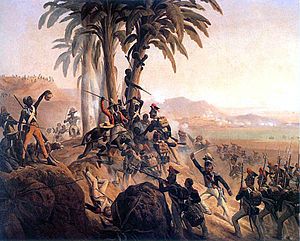 300x241 Commander: Jean Jacques Dessalines / (vacant) Forces: 25210 irregular freemen, 3000 trained soldiers, 7 cannons, 2 mortars Organization: Largely unorganized. Situation: Morale is very high, training is mediocre but improving. Acting as impromptu police forces now that the revolution is won. Graduates of the military academy Chez Cabre are organized into small company units occupying previously-abandoned forts dotting the country. Soldiers spread throughout the nation, predominately in major cities. Haitian Navy "Admiral": Henri Christophe Forces: A few dozen merchant ships. Organization: No organization Situation: No command structure; all ships are designed for local, intra-national civilian use, with very little in the way of defensive capabilities. =Foreign Threats= None currently. =Rebellions and Militias=  315x210 Les Zombies Leader: Baron Samedi Forces: 800-1000 "zombie" guerillas. Situation: A paramilitary force led by the mysterious Baron Samedi. Engages in violent operations during darkest nights, invoking mystical folklore to terrorize survivors. Strong suspicions among Haitian elites that the Baron is actually Toussaint himself. =Stats= 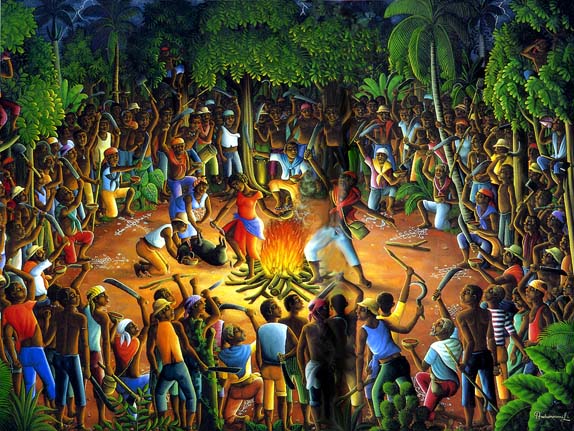 574x431 Agriculture: Extensive sugar plantations, harvested by the former slaves. Many abandoned or destroyed plantations across the landscape whose fields lie fallow. Industry:: What few industries existed before the revolution have been put into complete disarray since. Food: General surplus from fleeing of the white non-agricultural populations. Labor: No restrictions on working hours or hiring practices. Slavery and other coercive labor outlawed. Education: 6% literacy for men, 2% for women; almost exclusively among gens de couleur. Primary education conducted through local parishes. Wealthy elites hire private European tutors and send their children to overseas universities. Public Health: Major cities contain few sewers. Health care largely provided by clergy and local healers. Crime: Military force acting as impromptu police officers. General disorder throughout the nation. Trade: Primarily trading with Britain, selling sugar revenues. Sweden and Spain eager to have part of it. Finance: International trade uses the French livre, but the pound sterling becoming more prominent as trade with Britain increases. Local transactions largely through bartering. Urbanization: Most live in the countryside on the thousands of plantations. Cities rather emptied by the fleeing colonials. Religion: Most practice Catholicism. Somewhat divided by ethnicity, with gens de couleur being almost exclusively Catholic, but with many freed slaves practicing syncretic faiths, including Vodou and "Samedism." Freedom of religion, with no state-sponsered church or belief. Ethnic Groups: 93% black, 5% gens de couleur, 1% white French, 1% other. No official language, though French is used among the cultural elites, with Creole being used by everyone else. =Budget= Needless to say, the revolution has halted most tax collection services, at least for now. But at its height Haiti alone produced more wealth than the entire American Thirteen Colonies combined. quote:Contributions Directes:
|
| # ? Dec 4, 2012 04:21 |
|
 You fools. You unspeakable, unmentionable, utterly inept and insane fools. Your folly has destroyed whatever hope this Republic has had of survival. It is over, finished, done! Your utter lust for power, your GODDAMN IDEOLOGICAL NEED FOR PURITY has quite destroyed this republic. *twitches* I see now. Moderation has failed. Audacity, audacity, it must always be audacity. The people clamor for the blood of their enemies. We would be a most unfitting government if we failed to give it to them. Brittany shall burn, Germany shall burn, and if we have to fill the channel with the bodies of the Bretons, Britain shall burn. Oh, and even though Lafayette was a moderate, he was still a Frenchman. Sweden shall burn for their betrayal. Vivé la Republique.
|
| # ? Dec 4, 2012 04:34 |
|
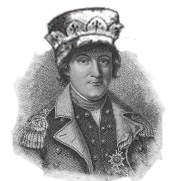 'Steward of the Duchess' Charles Armand Tuffin, marquis de la Rouerie Steward of the Duchess for the Elective Duchy of Breizh/Brittany for Mari Tereza Charleza I ar Vourboned Address to the Nation posted:I told you that this was coming. I told you that this was what the French would bring. I told you they lied when they said we were simply making things up.
|
| # ? Dec 4, 2012 05:11 |
|
 Louis Cahnon, Freelance Detective and General Fancy Man About Paris Louis had spent the rest of the day doing some minor foot work for a client; nothing too strenuous, just something that had to be done. Besides, the cover of night was needed for what he had planned. As it turned out, the freelance detective actually didn't need darkness to go about his work; there was disturbance in the streets of Paris, involving a lot of speechifying and burning of effigies. From what Louis could gather, it had something to do with politics. Personally, he stayed away from the stuff; it was headier than fine wine and more addictive than tobacco, all with the added chance of its practitioner losing his head. Best not to get involved at all. He approached his target casually, sidling up to the building with great care. The Happy Dragon Tobacco Shop was, of course, closed, but that mattered little to Louis, who went to work on the door's lock with his small thieves' kit. In no time, the door popped open, letting out a little groan. If it had been any other night, Louis would've been worried about the sound, but he doubted it could be heard over the chanting of the mob. What a city. Still, the better part of valor and all that. Louis took out his flintlock, pushed the door open with the gun's barrel, and stepped in to the shop. It was... completely empty. Everything, absolutely everything, was gone. What the hell? Amsterdam had been absolutely certain that the Happy Dragon had something to do with the cat, Louis had seen it in the Dutchman's eyes. If the owners of the Happy Dragon had caught wind that Louis was on their trail and split with the cat... what did that mean? Clearly the cat was more valuable than just as a beloved pet. What was worse, now he didn't have any leads. Well, that was that. Louis was a failure. He kicked the ground of the store and stubbed his toe on a nail, which in turn caused him to drop his flintlock. After cursing every saint he could think of, he went to retrieve his gun. As he picked it up, he noticed a scrap of paper trapped under it. Well, it looks like Providence had provided a clue. Louis smiled. He should've never doubted that God was on his side. He turned the paper over to read the words on the other side. Brest, Brittany. That was it. It wasn't much of a clue and Brest certainly wasn't Paris... There was a loud crash, followed by some yelling. Louis looked out the shop's window; the mob had turned into looters. Suddenly Brest sounded a whole lot better than Paris.
|
| # ? Dec 4, 2012 05:19 |
|
A speech by Toussaint in front of a crowd in Port-au-Prince, early in the summer, as recorded by his scribe. My friends, we are in danger. Recently, many of our brothers have fled to our nation seeking freedom, and instead they have found that their former masters threaten war. Soon we will again find Europeans on our lands holding not olive branches, but muskets. We must prepare for the defense. As such, I propose another modest increase in taxes. In addition, I remark that the gifts of freedom have been bountiful upon our island. The enigmatic Charles Hector, though a white Frenchman, has supported our freedom since the beginning, and has taken residence on our island. He has, living in a society of liberty, been free to create marvelous devices. I intend to fully support his endeavors so that he may give back to our society which has given so much to him. I hereby appoint him as the Minister of Science, Education, and Industry. My friends, we have freed ourselves from the valley of slavery, we have ascended the hill of ignorance, and are now about to reach the summit of justice. When we arrive there, we may look upon the vista of peace and glory as the sun rises before our very eyes. The future will not be easy, but remember: we are all in this together. from the desk of the General-Secretary posted:Contributions Directes:
|
| # ? Dec 4, 2012 05:40 |
|
 A note, barely legible on a tiny piece of torn parchment, is read aloud before the National Guard headquarters in Paris quote:I'll be back - L
|
| # ? Dec 4, 2012 05:48 |
|
A few days later, Toussaint is seen with Charles Hector walking past a number of abandoned warehouses in Port-au-Prince. The two point and nod approvingly, though nobody can hear precisely what they are saying. A page from a journal believed to have been written by Toussaint, dated May 1793. "...spring's day. Charles and I took advantage of the fortuitous weather by inspecting the buildings along Port-au-Prince's harbor. Hector found a few that suited his needs admirably, and we're shipping some of his machines over before the end of the month. He thinks with some slight modifications they can be turned into something far more productive. One building in particular was quite the oddity: shaped like a triangle, it apparently used to house what little manufacturing existed in the city. It, like so many other things, was abandoned by the white flight, but it's large enough to house a hundred people and some machines. Hopefully we can have this Triangle Shop up and working by the..."
|
| # ? Dec 4, 2012 06:00 |
|
 Charles Hector's Diary posted:
|
| # ? Dec 4, 2012 06:20 |
|
"...Temporary alliances are the tool of a wise leader, who uses the strength and blood of others in the furtherance of his goals. Even those who are considered to be enemies may be used. When the time comes to discard his 'allies', he does so without a second thought..." Collected works of the Teacher, volume II: Supplication
|
| # ? Dec 4, 2012 06:22 |
|
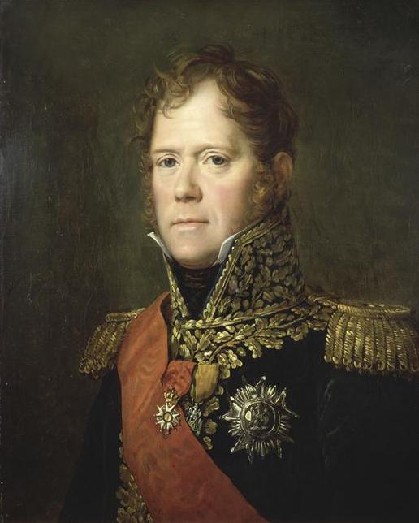 419x523 Général Michel Ney, commander of l’Armée des Alpes Letter to the President and members of the Assembly posted:The campaign in Italy has been successful so far. We have captured the portion of the country on our side of the Alps and stand poised to seize the entire nation. Furthermore, the Austrians have been distracted as can be seen by the absence of an attack in Lorraine. However, I fear that soon the new Emperor will solve his Ottoman problem and turn to push me out of Italy. I will need reinforcements to further my position, but the capture of Général Lafayette leaves the question of leadership dangling in the air. Letter to Général Joseph Marie Servan de Gerbey posted:Colleague,
|
| # ? Dec 4, 2012 06:30 |
|
 President of the French Republic Louis Philippe Joseph d'Orléans, “Citoye Egalité” In light of General Lafeyette's capture, I appoint General Michel Ney as minister of war.
|
| # ? Dec 4, 2012 06:30 |
|
 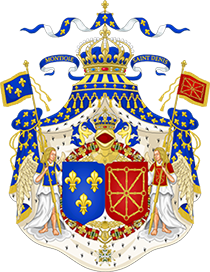    Louis Stanislas Xavier, Regent of the Kingdom of France and Navarre, comte de Provence, Commander of L’Armée des Princes, Glorified Ally of Brittany, Knight of the Order of the Ermine, acting in lieu of His Majesty The King, the young Louis XVII A letter to the Duchess of Brittany posted:Marie Thérèse,
|
| # ? Dec 4, 2012 06:30 |
|
Colonel Wood posted:President of the French Republic Louis Philippe Joseph d'Orléans, “Citoye Egalité”  419x523 Général Michel Ney, commander of l’Armée des Alpes I accept this position with humility.
|
| # ? Dec 4, 2012 06:36 |
|
 President of the French Republic Louis Philippe Joseph d'Orléans, “Citoye Egalité” I hereby lift the ban on the Enrages. All parties should be allowed to participate in the Republic! I also strip General Gerbey of command of the Army of the Pyrenees. He has abandoned his command in the name of political power leaving us vulnerable along the Spanish border! His cowardice, greed, and avarice are disgusting examples of the King and the corrupt, bloated, incestuous monarchy we have overthrown! He seeks to be another King!
|
| # ? Dec 4, 2012 06:46 |
|
Saint-Just The President is reminded that the allowing or banning of parties is the right of the Assembly, not the Presidency. The President is also reminded that the Enrages blew up the assembly building and are currently in revolt in Picardy, and considers the unbanning of the party unwise. The Assembly also feels that Marshal Ney is needed at the front and that his appointment as Minister of War is premature at this time. The Assembly invites the President to discuss his appointments with it before making them. The Assembly also feels that General Gerbey is needed and that his dismissal is unwise.
|
| # ? Dec 4, 2012 06:51 |
|
Epicurius posted:Saint-Just I would like to remind Monsieur Saint-Just that the ban was instituted by the Minister of Justice and not put through the assembly. The radical wing of the Enrages responsible for the bombing are confined to Picardie. Also, General Ney is the most capable man for the position. General Gerbey has, again, abandoned his post in the pursuit of political power. That is a crime punishable by death, or does Msr Saint-Just not recall the punishment for desertion in a time of war? I hereby appoint General François Christophe de Kellermann as commander of the Army of the Pyrenees
|
| # ? Dec 4, 2012 07:00 |
|
Georges Cadoudal From his Diary posted:Nantes, thrice-saved, your walls/
|
| # ? Dec 4, 2012 07:53 |
|
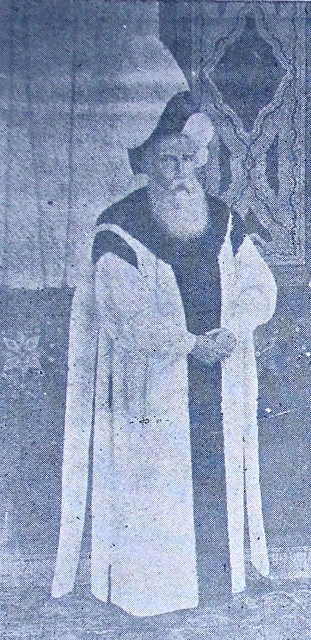 311x640 Koca Yusuf Pasha, Ambassador of the Ottoman Empire No, no, everything is going to hell, and it's all my fault. What, what, can i do. Arujei posted:Georges Cadoudal Can i interest you in some Turkish coffee monsieur Cadoudal?
|
| # ? Dec 4, 2012 15:11 |
|
 President of the French Republic Louis Philippe Joseph d'Orléans, “Citoye Egalité” In further response to General Gerbey's actions I order a military investigation into his desertion of the Army of the Pyreenees and his involvement in the plot to overthrow the Republic. I am placing the Acquisition Committee under the purview of the Minister of War, Michel Ney. I am also personally taking control of the National Guard until a new commander can be found.
|
| # ? Dec 4, 2012 15:56 |
|
Condorcet, overheard while drunk Now that Ney, now he's a real soldier. Man has his head on his shoulders and knows the science of war.
|
| # ? Dec 4, 2012 16:43 |
|
 Turn is tentatively due on Thursday Dec. 6th! Also, there are presidential elections next turn - theoretically - so if you want to run, you should post it in the thread as presidential elections (like all actions in the 'legislative phase') are processed at the very start of the turn. Turn is tentatively due on Thursday Dec. 6th! Also, there are presidential elections next turn - theoretically - so if you want to run, you should post it in the thread as presidential elections (like all actions in the 'legislative phase') are processed at the very start of the turn. 
|
| # ? Dec 4, 2012 18:05 |
|
 quote:Reflection on Recent Events
|
| # ? Dec 4, 2012 18:24 |
|
The ottoman ambassador is leaving us, because bluntly i was bored and doing my own thing, i'm gonna go have fun in france. Joseph Fouche Greetings gentlemen of the senate, i would like to publicly and proudly call myself a Frenchman and a Breton today with the signing of this document which ratifies and recognizes our Breton and Occatine brothers as unique part of our shared french heritage. I would also like to publicly and loudly condemn the actions of monsieur Tuffin and Cordoual for their actions in misleading the people of Brittany, they are rabble rousers, reactionaries and particularists of the worst sort, who have brought nothing but chaos and death to my homeland. I weep to see what devastation they seek to wrought upon Nantes, and how they would tear beautiful France apart.
|
| # ? Dec 4, 2012 18:31 |
|
-=The Declaration of Independence of Gaule=- posted:The people of Gaule stand today in clear recognition about the global state of affairs, and the history of this earth. Signatories: -Napoléon Bonaparte -Jacques Pierre Brissot 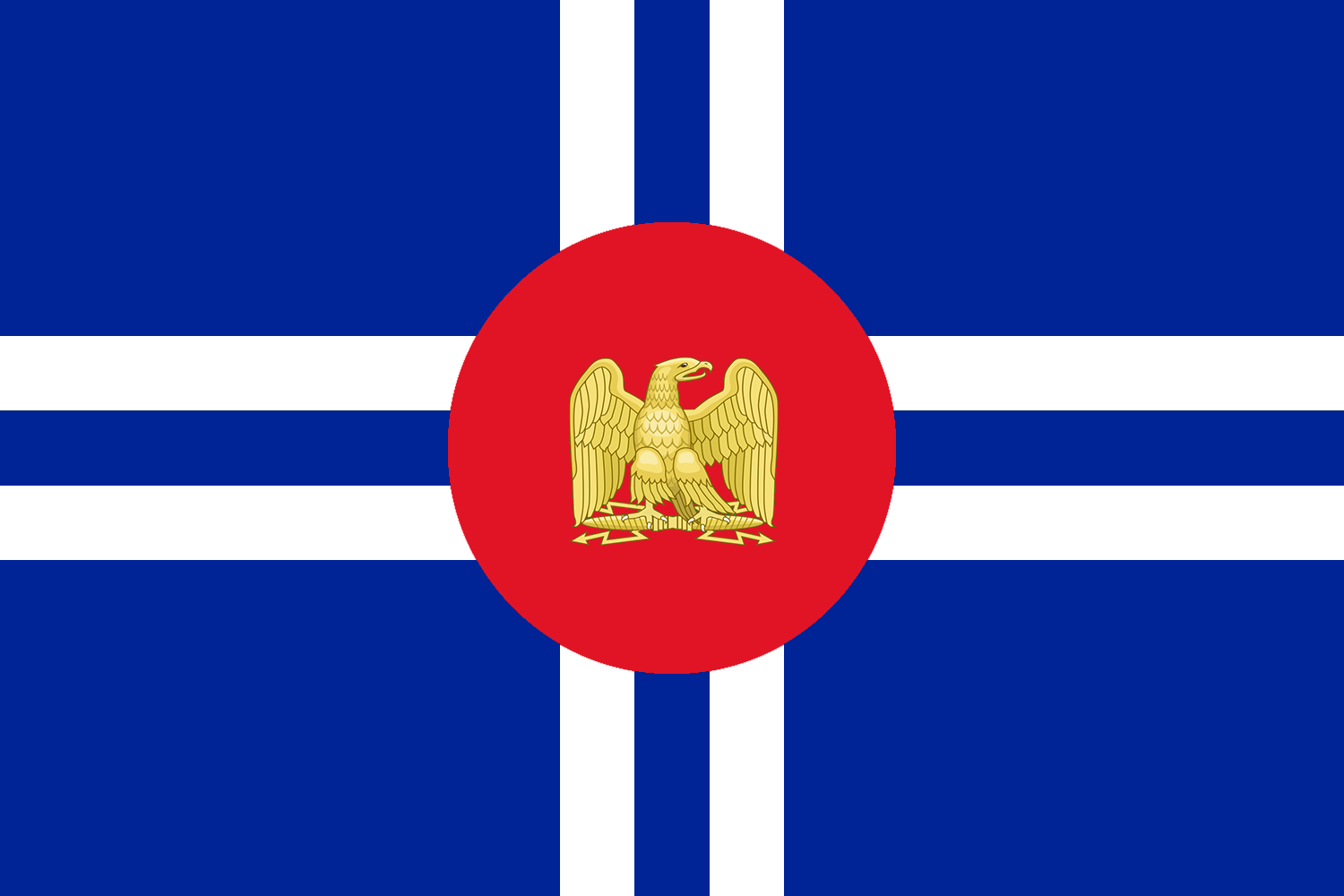
|
| # ? Dec 4, 2012 22:23 |
|
 Mari Tereza I ar Varbouned Open letter to the nations of Europe posted:There are few sins greater than kinslaying, yet even today there are people who commit the same travesty Caine did to his brother. We never wanted conflict with France, despite the fact they despised and persecuted us. When it came, we at least hoped it will be civilized. Lafayette has proven us wrong again.
|
| # ? Dec 4, 2012 22:57 |
|
 411x478 Joseph Fouche People of France, hear me, i Joseph Fouche am campaigning to be your second president as a Jacobin candidate i promise you that i shall -Continue to strip the old privileges of the aristocracy, striping them of their land and giving it to the good people of France. As i have given of my own free will the land that was once mine not by any true right but by simple circumstance of birth. Any aristocrat who resists shall meet monsieur guillotine. -Continue to protect your new rights of cultural and religious equality, that all my be free men and seek reason in their own ways. -To seek a peaceful and just resolution with all those who revolt against France, why should brother kill brother, we are all Frenchmen. There is one France, and it is big enough for all of us! -To defend our republic against the aggression of the German tyrants, and British imperialists. -To serve the will of the people, for what is a president if not the peoples most trusted and faithful servant? Speak your desires that i might hear them, and that i might better serve you. Joseph Fouche the canidate for a FREE AND UNITED FRANCE!
|
| # ? Dec 4, 2012 23:06 |
|
 Gustaf af Wetterstedt Swedish Ambassador An open letter to the French Government and the World posted:The affair in Brittany is a tragedy to God and Humanity. The reports from within the country, points to that the French effort to bring the Breton people back into the fold, have taken for a darker turn... How true these allegations are, we don't know. And if they were, how guilty of it, Lafayette is, is also in question.
|
| # ? Dec 5, 2012 00:00 |
|
Saint-Just The Jacobins propose a bill in the Assembly! (When they can be heard over the rioting outside). The Second Treason Act establishes a permanent judicial body called the Tribunal. Judges from the Tribunal shall be appointed by the Assembly, and the Tribunal and its subordinate courts shall have sole authority to try those accused of treason, sedition, and anti-Republican activity.
|
| # ? Dec 5, 2012 01:00 |
|
Epicurius posted:Saint-Just  Hear, hear! Let the proper condemnation of traitors rest in the hands of the representatives of the people!
|
| # ? Dec 5, 2012 01:02 |
|
Epicurius posted:Saint-Just 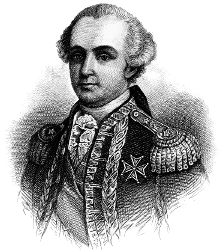 A panel of fucking toadies of the Assembly who can order executed anybody the mob drags in front of them with absolutely no checks on their power or safeguards against the Assembly just staffing it with yes men so they can purge political enemies? Yeah, there's no way this won't fucking work
|
| # ? Dec 5, 2012 01:25 |
|
 President of the French Republic Louis Philippe Joseph d'Orléans, “Citoye Egalité” I exercise my veto on the Second Treason Act. Establishing punishments for treason is one thing, but creating a separate court beholden only to the assembly goes against the spirit of the Republic and Liberty. A citizen has the right to choose a trial by a jury of his or her peers regardless of the crime. Rigged trials and secret courts are something we did away with when we overthrew Louis XVI. Monsieur Saint-Just seems to style his legislation in the absolutist terms we have fought so hard against.
|
| # ? Dec 5, 2012 01:43 |
|
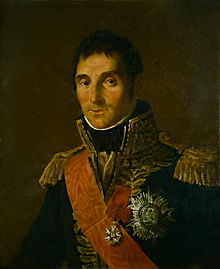 Général André Masséna, Commandant de l'Armée du Nord In a letter to the Legislative Assembly: Noble representatives, I write to you today of the delicate situation that now exists in the former Austrian Netherlands, now liberated by the soldiers of France. While I make preparations to defend our gains and continue our victories over the Germans, I recognize that the question of the status of these newly-liberated lands hangs in the air. I know that many in Paris believe we should simply annex these lands, and while I am of course beholden to your wishes, I must advise that I do not see this as the wisest course of action. While any intelligent man would recognize that French republicanism is preferable to German tyranny, the inhabitants of this land may still prefer their own nation, or unity with their Dutch brethren to the north (providing, of course, that a true republic is established there). There is also the linguistic divide to consider. While the French-speaking people of the south may be integrated into the French nation, the Dutch-speaking people of the north are likely to feel more kinship with their northern neighbours. Therefore it is my proposal that there be no immediate annexation of these lands. Rather, I propose that the lands remain fully under French control until such a time as a referendum can be held. At that time, the people of the former Austrian Netherlands would be asked to decide between full annexation by France or the creation of an independent state. Assuming the current autocratic regime of the so-called Dutch Republic is replaced by a true republic, a third option, that of a split annexation between this new republic and our own along linguistic boundaries, would be added. It is most likely that such a referendum could not be held until the surrender of the Austrians and Prussians. In the time between now and then, I would suggest the centralization of power in the region in the hands of a military governor who could ensure French control of the region. Given that my duties are likely to keep me here for some time, I would naturally put forward my own name for the position. Of course, I am in all of this beholden to follow the wishes of yourselves, the elected officials of the republic, and everything put forward here is merely suggestion. I hope that my advice will be helpful in the formation of a decision on your parts. Thank you for your time. Your humble servant, Général André Masséna
|
| # ? Dec 5, 2012 02:33 |





















